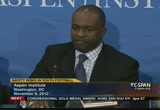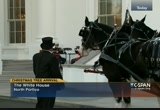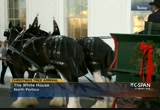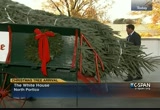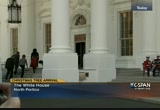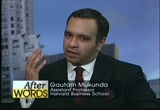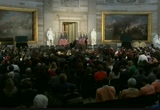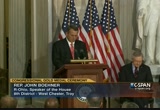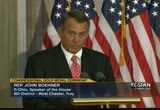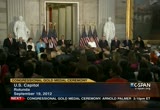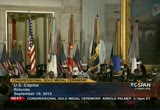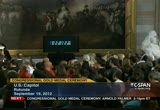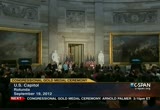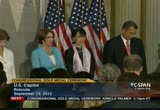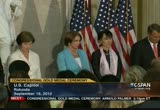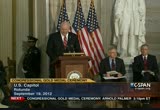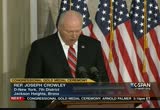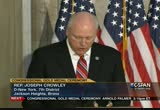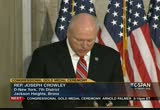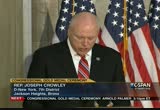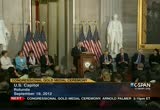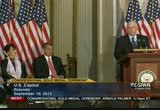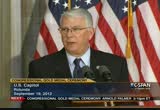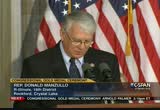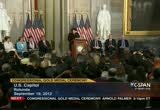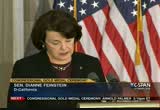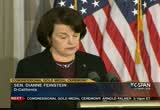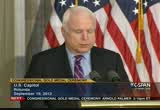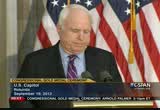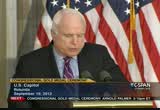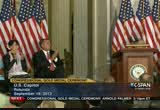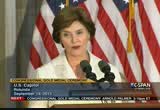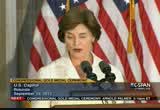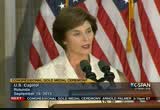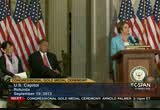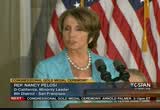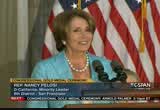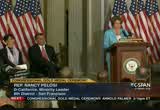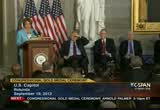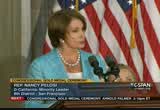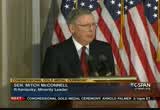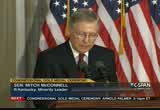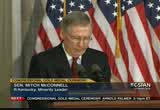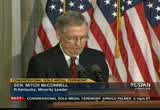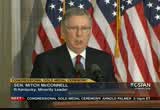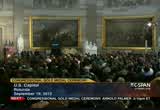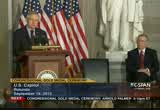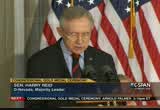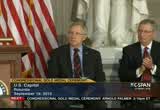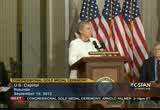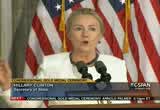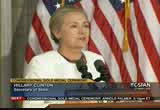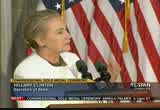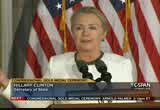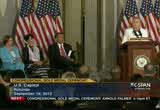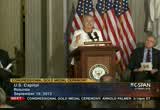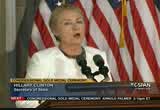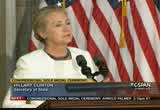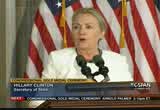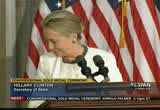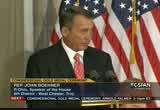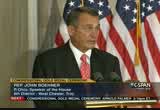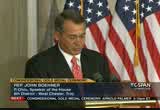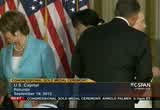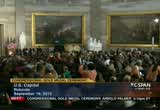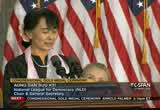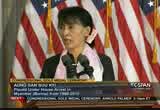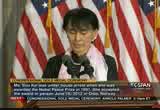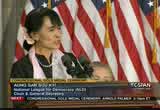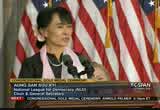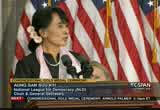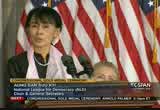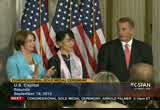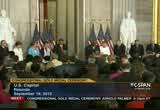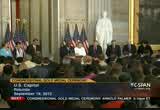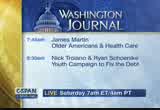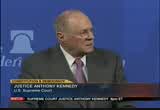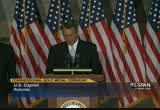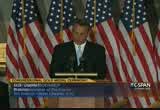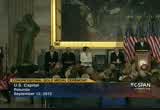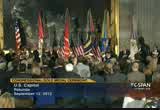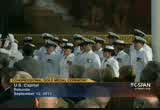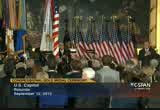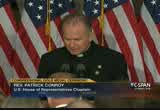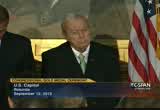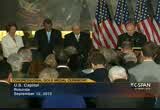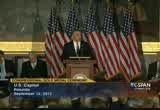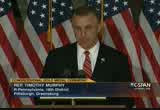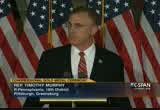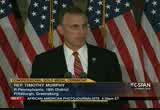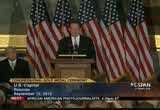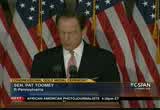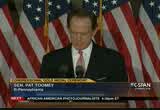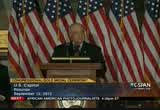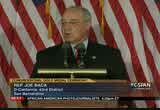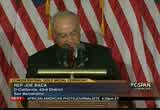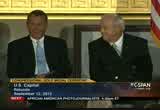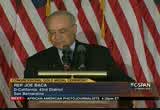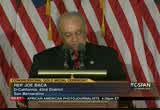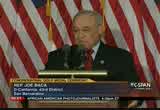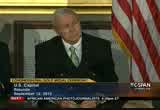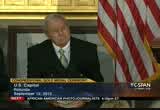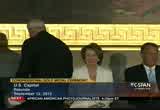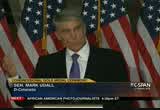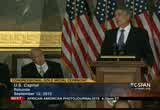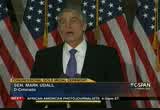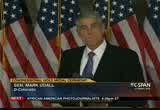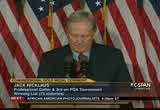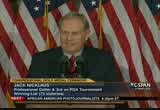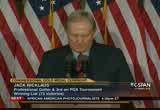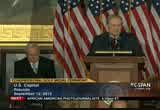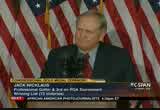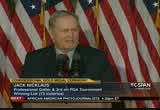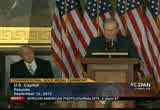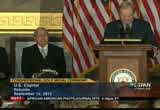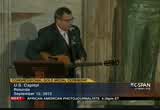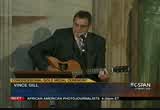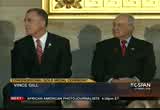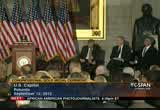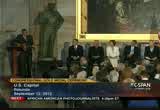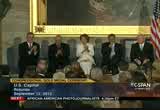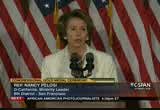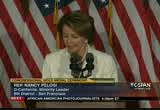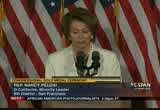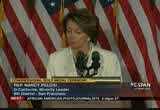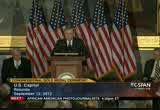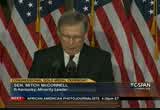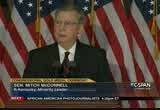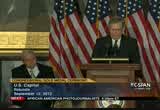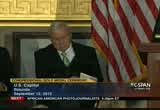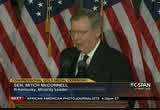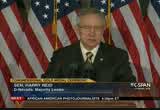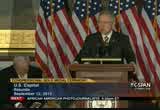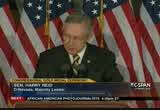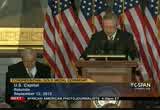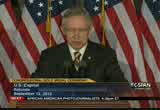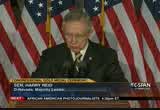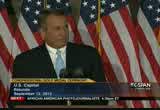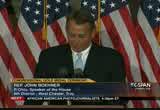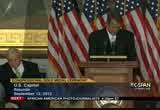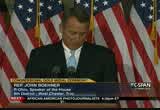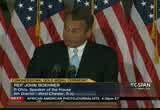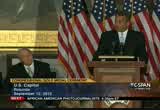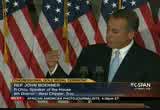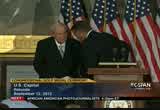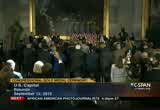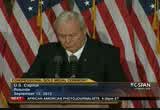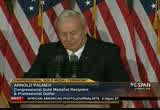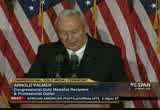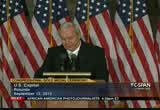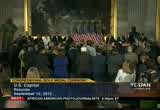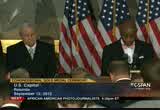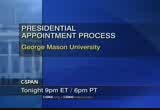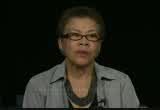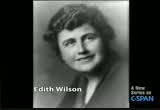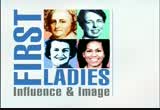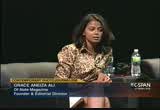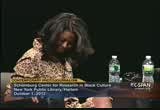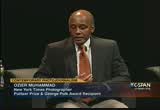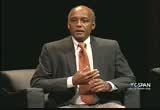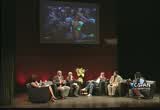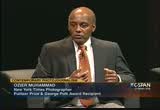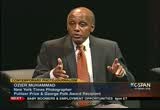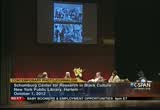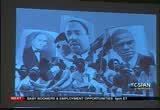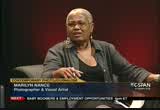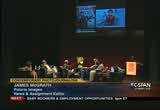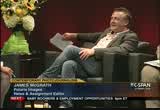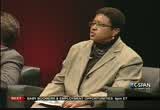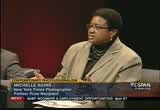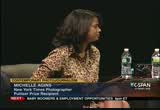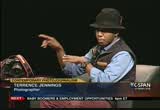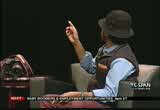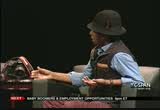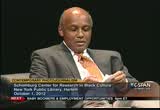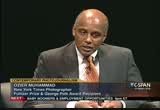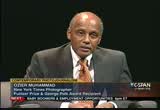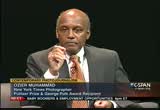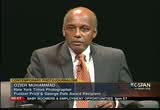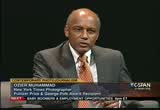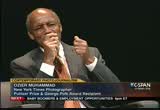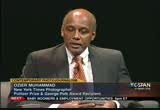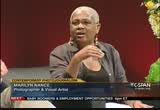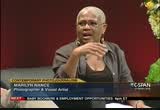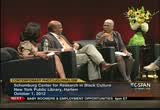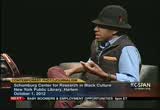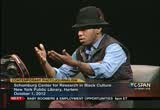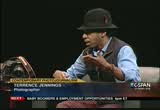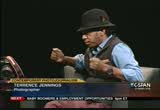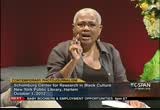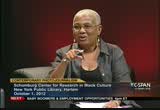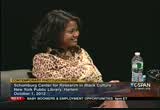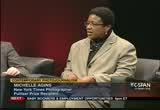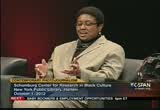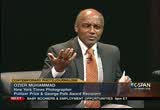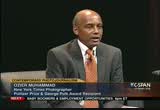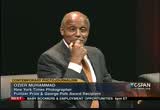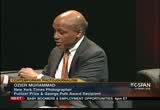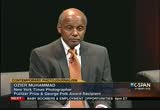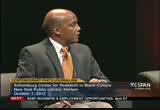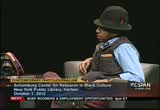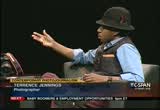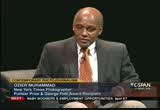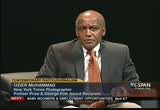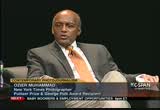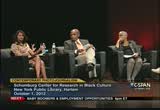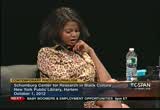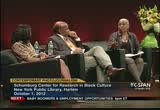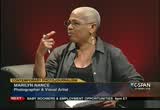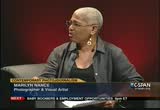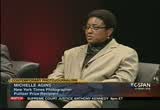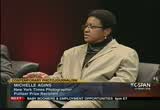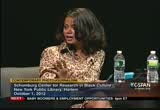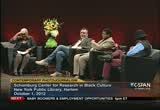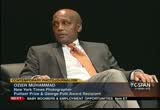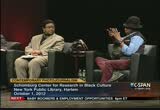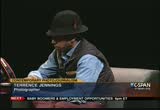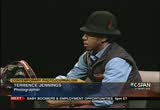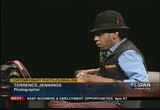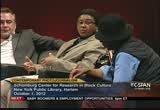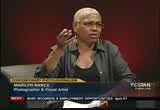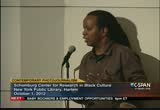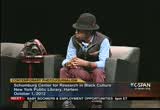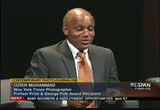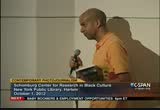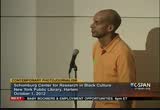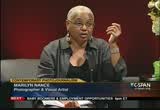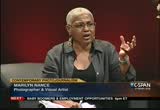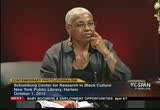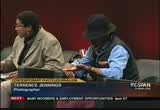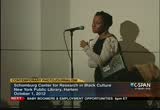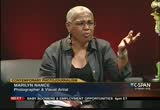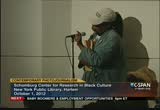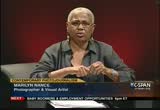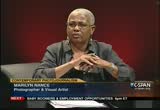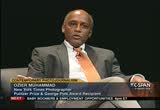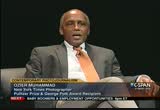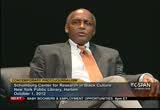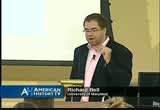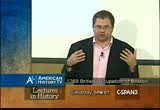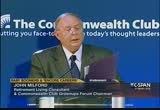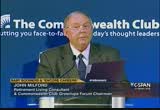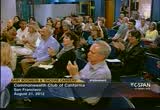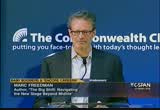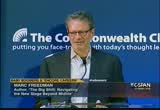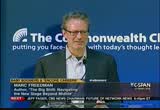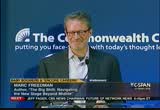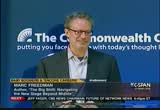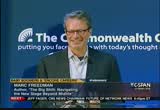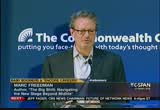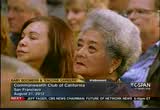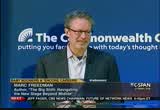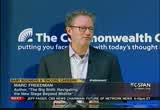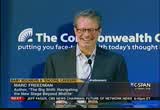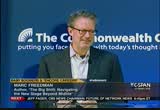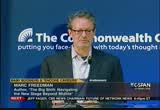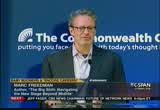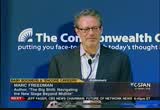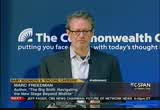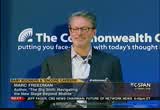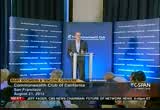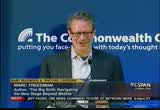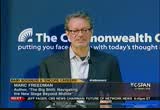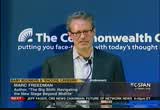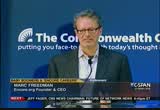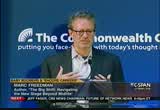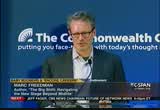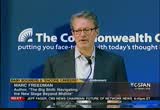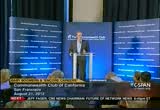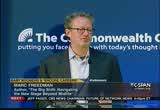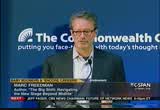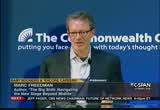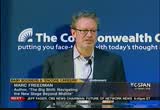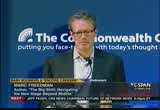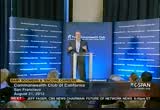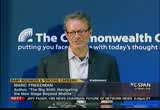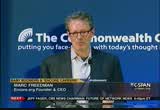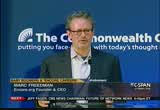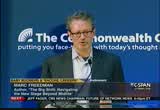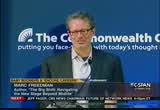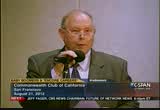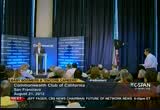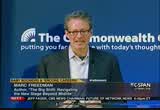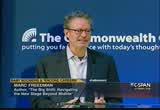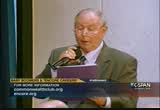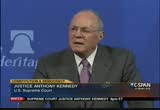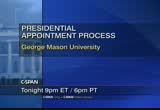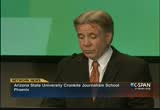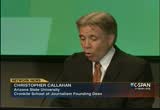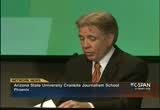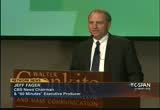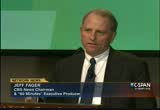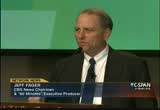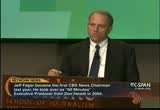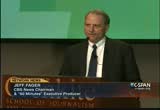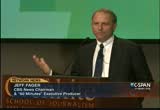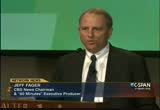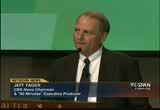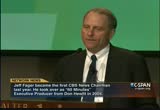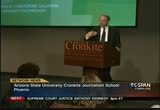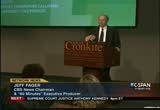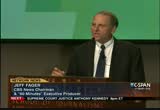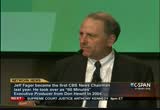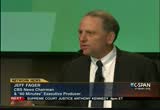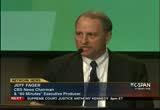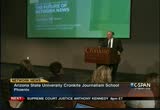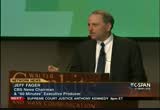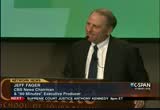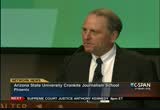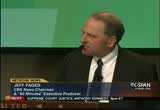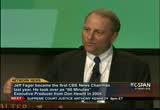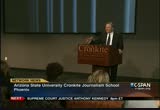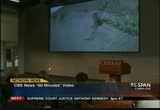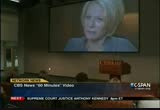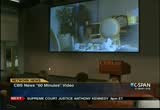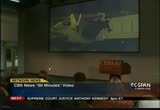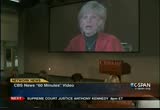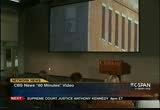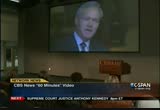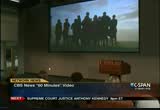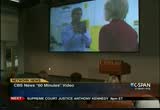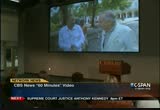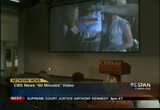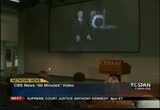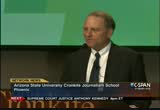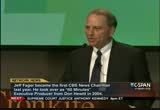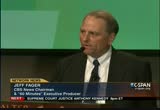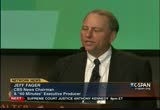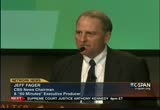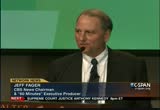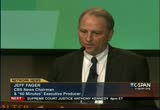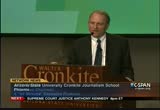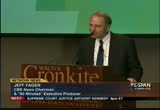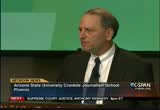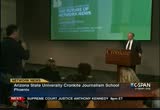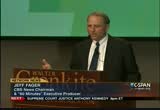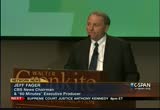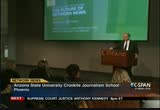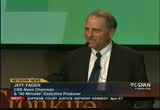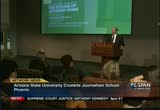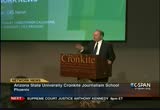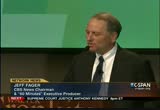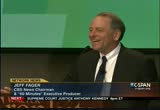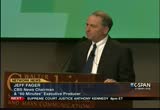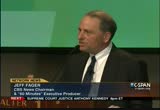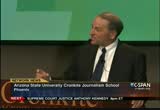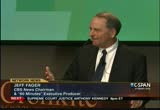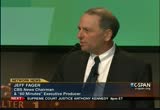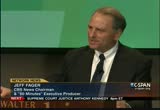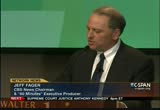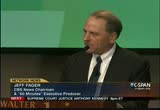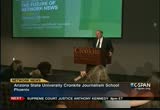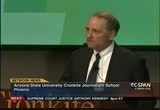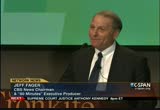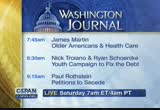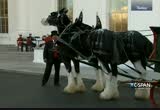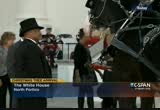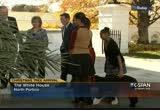tv Politics Public Policy Today CSPAN November 23, 2012 2:00pm-8:00pm EST
2:00 pm
great answer to your question is those players that feel strongly about it have spoken up. i would think they would continue to do so. >> ok, thanks. >> appreciate it. [captions copyright national cable satellite corp. 2012] [captioning performed by national captioning institute] >> the white house christmas tree was delivered this morning. it is from ash farms and has provided the white house tree each year since 1966. [instrumental of o christmas
2:01 pm
2:03 pm
2:04 pm
>> here is some of what we have coming up for you today here on c-span. nobel laureate and burmese opposition leader aung san suu kyi excess the congressional gold medal, followed by another congressional gold medal ceremony with professional golfer arnold palmer. later, african-american photographers talk about the integrity of photojournalism. watch the history of the presidential appointment process at george mason university tonight at 9:00 eastern here on c-span. >> i can remember barack obama's speech in 2004. the democratic national convention, this dazzling speech that instantly makes him a national figure. without that speech, he is not a possible candidate.
2:05 pm
lincoln gives a beautiful speech in new york, a testament to the quality of his life, a fantastic speech, worthy of praise. but when he ran for the senate -- when barack obama gave his speech in 2004, he was running for the senate and he won. abraham lincoln ran for senate and he lost. if you want to think about abraham lincoln and the presidency, think about if barack obama had run for senate in 2004 and lost. that is the kind of obscurity we're talking about. >> book tv, sunday at 9:00 p.m. and midnight eastern, part of book tv's holiday weekend on c- span-2.
2:06 pm
>> and now burmese opposition leader aung san suu kyi excepts the congressional gold medal. secretary of state hillary clinton and former first lady laura bush were among the speakers. this is just over an hour. >> ladies and gentlemen, the speaker of the united states house of representatives, the honorable john boehner. >> ladies and all men, good afternoon and welcome to the capital. this is a great day for the american people, and we are happy to welcome you here today.
2:07 pm
gold medals are the highest level of appreciation for distinguished achievement. the first congressional gold medal was awarded to general george washington in 1776 for liberating the city of boston. today, we will present a congressional gold medal to aung san suu kyi in recognition of her efforts to liberate the people of burma. today, we celebrate her steadfast commitment to democracy, stability, and human dignity, and we do so in a manner worthy of her ideals. nancy pelosi initiated the measure of awarding this metal and republican george w. bush signed into law. his wife, former first lady laura bush, is with us today, as
2:08 pm
is her predecessor, secretary of state hillary clinton. coming together in mutual respect, a step from the chambers where we passionately debate the issues of the day that has become almost second nature to us. but it is a blessing, and we will hear over and over during the course of this ceremony, aung san suu kyi has shown the world just how hard one it really is. on behalf of the congress, let me express how humble and honored we are by your presence here in the rotunda of the united states capitol. >> ladies and gentlemen, please stand for the presentation of the callers by the united states armed forces color guard, the singing of our national anthem, and the retiring of the colors.
2:10 pm
dawn's early light, what so proudly we hail at the twilight's last gleaming, whose broad stripes and bright stars, through the perilous fight, o'er the ramparts we watched were so gallantly streaming, and the rockets' red glare, the bombs bursting in air, i gave proof through the night that our flag was still there. oh say does that star spangled the landet wave, o'er of the free and the home of the brave.
2:12 pm
of the united states house of representatives, the rev. patrick convoy, and gives the invocation. >> let us pray. god of the universe, we give you thanks for the gift of life and for the many blessings that life brings. today, we gather in this hallowed temple to representative government dedicated to the enjoyment of life and its blessings by its citizens, to honor aung san suu kyi. we are honored by her presence and her heroic witness to the dignity of each person, most especially in her native land of
2:13 pm
burma. her story is known to all, her example among the greatest of our time, of all time. we ask that as we come together you bless our o gathering. may we all be emboldened to give of our life as she has done, to stand up for human freedom wherever it may be denied. and bless her most noble of causes. move the hearts of those who would deny freedom to her and to the people of burma. may our actions today add to the universal out cry for justice and freedom so that the blessings of life will burst forth for the citizens of aung san suu kyi's need of burma.
2:14 pm
god bless the nation of burma and bless the united states of america. amen. >> please be seated. >> ladies and gentlemen, the honorable joseph crowley, representative of the seventh district of new york. >> thank you speaker and reverend conroy. thank you to all of my colleagues here today as well as the distinguished senators here with us. mrs. bush and madam secretary, our thanks and appreciation to both of you for not only taking
2:15 pm
the time to be here today, but for your many contributions to this effort and for your commitment to advancing the cause of freedom and democracy in burma. i would be remiss if i did not also mentioned someone who is not with us here today and that is congressman tom lantos. he and his staff worked so hard on burma for so many years. i wish you were here today to share this moment in history with us. today is an amazing day. today is an incredible day. who would have thought that when this bill was introduced in the house in 2008, when aung san suu kyi was still under house arrest, that in a few short years she would be standing or sitting here with us on u.s. soil receiving this honor, and
2:16 pm
as a member of the burmese parliament? back then we thought about granting the meddle in absentia, which may have -- medal in absentia, which may have been the first time in history that a person would have received it while in detention. who would have thought this change was possible? who would have thought this could happen? let me tell you one who believed it could come true, and that is aung san suu kyi herself. she might be too humble to admit it, but i know that she always thought this day, this moment would be possible. not because she is someone who worries about awards or honors, because i can tell you she certainly does not. she believed it because she and the burmese people always believed that change was possible. they hoped, they fought, the new change must come to their country.
2:17 pm
she knew the burmese people yearn for human rights and most importantly deserve democratic governance. she stepped the flames in a peaceful way for a lasting change -- stoked the flames in a peaceful way for lasting change. her efforts have helped lead us where we are today. there has been a lot of advancement made in burma over the last two years. we must recognize and give thanks to all those who have had the courage to help lead and support the change in burma, including those in the current government. we also must honor those who made the great sacrifices, in prison, lives lost, to get to where we are today. far too many have played too high a price in the effort to bring about freedom and democratic governance in burma. it is with those people in mind,
2:18 pm
those who have sacrificed so much, that we knowledge the work that is not done yet. we must be sure that momentum unfolds into sustained progress, into permanent freedoms and solidified democracy, because as much as i would like to believe that the change in burma that has occurred is irreversible, as much as i would like to revel in blind optimism and believe that it is note is onwon, yet. the tides can reverse if we do not remain vigilant in the demand for progress. but let there be no doubt, today is a moment of joy, a moment to honor a genuine hero or heroine, someone who was in towards solitude, someone who has been
2:19 pm
forced to watch others -- who has endured solitude, someone who was then forced to watch others suffer, someone who has put country before self, someone who has inspired millions to stand up for justice, someone who has given voice to a movement, someone who has led with the unwavering commitment. that person is daw aung san suu kyi, and we are so very proud to stand here and honor you today. [applause] >> ladies and gentlemen, the representative from the 16th district of illinois, the sulo.able donald mann
2:20 pm
>> distinguished guests, ladies and gentlemen, my family, i come before you today to homely welcome a legendary human rights champion -- humbly welcome a legendary human-rights champion to a ceremony many of us never thought would happen. i worked on the committee to give the gold medal in the year when aung san suu kyi was in her 13th year of arrest. your presence here today is nothing short of a miracle. but patriots succeed because of
2:21 pm
miracles. the sound of freedom can never be silenced. it is a testament to the incredible strength of your convictions and to the death of your aspirations for burma to achieve -- depth of your aspirations for burma to achieve democracy. it means so much to all of your supporters that you have made the time to visit us. aung san suu kyi needs no introduction because there really are no words that can adequately describe the sacrifice that this woman has endured for over 15 years. we all know the incredible story of her dedication and her love for her beloved homeland and its people, but underneath the public face, there is a daughter, a mother, a beloved companion who put everything she held here on the line to fight injustice and oppression. there are no awards that'
2:22 pm
replaced the time lost or the pain into word, but this time lost must not and will not be in vain. we must follow the example set by aung san suu kyi and continued to fight oppression wherever it rears its ugly head. we gather today not only to praise her accomplishments, but to bring to light the anguish and suffering of all those around the world to continue to suffer. we must not forget the decisions made in washington have a real and lasting impact on individuals around the world. aung san suu kyi, let me congratulate you on making a tremendous difference in burma and in the rest of the world. you are a true inspiration for all of us. as the leader of the opposition, your responsibilities were significant, but in my opinion,
2:23 pm
there is nothing you cannot accomplish. when you addressed the subcommittee via video last year, i was overcome by your resolve and spirit. you asked the congress to support burma and her people and i am happy to report that we have not failed you. [applause] >> ladies and gentleman, the senator from the state of california, the honorable dianne feinstein. >> mr. speaker, leader pelosi, mrs. bush, leader reed, leader mcconnell, secretary of state hillary clinton and my colleagues in government, this is a special day to honor a special person in a special place. for many years, i have followed the tragedies and victories of
2:24 pm
this uncommonly courageous and persistent woman. in 1988, she quickly rose to be the voice of democracy in burma, creating the national league for democracy. elections followed in 1990, where her party won 80% of the seats. that joy quickly turned to tragedy. the military junta nullified the election and arrested aung san suu kyi. she would spend the better part of two decades under house arrest, unable even to visit her dying has been -- husband. in 1996, i recall being approached to sponsor a burma sanctions bill. sanctions were only loosened in july of this year. senator mcconnell later became
2:25 pm
one of aung san suu kyi's chief advocates in the senate and we continued to work on behalf of the people in burma. in 2003, following an assassination attempt, senator mcconnell and i worked to pass an important and that remains in place today, an effort to bring about further reform. and i must say, burma is extremely lucky to have a champion mike aung san suu kyi. in the face of violence, harassment, intimidation, she has never wavered in her pursuit of human rights. she celebrates the release of political prisoners, including the approximately 90 released this week, but she remains true to those still behind bars, estimated to be around two hundred.
2:26 pm
this woman sacrifice years of her life to bring about these changes. she is truly an inspiration to the world. you are so well deserving of this gold medal. i can only begin to express my happiness that we are able to present this to you today in this very special place, a very special woman. thank you. [applause] >> ladies and gentleman, the senator from the state of arizona, the honorable john mccain. >> at my age, i try to be realistic about how many more times i will be surprised by a wonderful and unexpected turn of events. i might of hope, but i am not sure i expected that one day i would have be honor of welcoming
2:27 pm
my personal hero, aung san suu kyi, to the congress of the united states, that she would be able to travel abroad without fear of being barred from returning to the country that she loves and served so well. i consider myself very fortunate to have lived to see this day and to know the people of burma, whose dignity and rights aung san suu kyi has sacrificed so much to defend, and will one day be free to live with liberty, justice and hope. it is a testament to the courage of the burmese people and the person they call simply "the lady," that that day is approaching. i have known quite a few brave and inspiring people, but none more so than the woman we honor today. i first met her 15 years ago when she was permitted to leave her house briefly to speak to me in rangoon.
2:28 pm
i was not prepared for her. she was exquisitely polite and graceful. she spoke softly and calmly, the picture of gentleness and serenity. is this the woman, i asked myself, who has managed somehow to cause so much trouble for the powerful, violent, unlawful men who have managed to rule this country? they have attacked her, and shelter, threatened her, isolated her, kept her family from her. they have done all that, done all that could be done to break her spirit and her will to resist. but as a union soldier once noted about u.s. grant as he sat
2:29 pm
on his horse placidly while shells exploded around him, aung san suu kyi did not scare worth a damn. "it is not power that corrupts," she said, "but fear." fear of those who are wielding it and fear of those who are subject to it. aung san suu kyi would not be afraid, and that, my friends, is the most powerful resistance human beings are capable of. i want to thank you my friend, the lady, for teaching me at my age a thing or two about courage, and for reminding me to always expect justice to triumph over injustice, goodness over evil, love over hate. [applause]
2:30 pm
>> ladies and gentlemen, the former first lady of the united states, mrs. laura bush. >> i want to thank the united states congress for allowing me to add my voice to the global chorus of honors for aung san suu kyi and to send along the deep respect of my husband george as well. the transition and burma, like past events in south africa or eastern europe, shows that
2:31 pm
history has a hopeful direction. it is capable of miracles. there is a part of every soul that longs for freedom, and any government built on oppression is built on sand. but as has been demonstrated, a vast historical changes often begin in a single mind, a single heart. any hope that now grows in burma is a tribute to daw suu. one of the most powerful governments on earth tried to silence one woman. easyst have seemed an task, but instead, it was broken by her character. her perseverance and violence were a symbol that integrity was
2:32 pm
still possible in burma, and a symbol became an inspiration for activists, months, and millions around the world. when her long isolation ended, some of us had finally met her a person and finfound not symbol, but a woman of tremendous humor, honesty and grace period that has only increased our admiration. when political prisoners are freed and normal political life revives, it is the start of a new task. burma has needed her courage and patience. now it needs her wisdom and leadership in the work of reform and reconciliation. her contribution to burma is decades old and just beginning. today our country honors an exceptional woman who became the
2:33 pm
mother of her country and we pledge our support in the work ahead. [applause] >> ladies and gentlemen, the democratic leader of the united states house of representatives, the honorable nancy pelosi. >> it is an historic opportunity to be here today with aung san suu kyi as she is awarded the congressional gold medal, the highest honor congress can be stow. i join my colleagues in thanking aung san suu kyi for her unwavering commitment to peace, nonviolence and democracy in
2:34 pm
burma. i associate myself with his remarks in praise of our former colleague chairman tom lantos and his family's efforts on behalf of this occasion today. it is appropriate to honor also the many burmese democracy supporters, many from california, senator feinstein, who are here with us today. we take this opportunity to remember those who have suffered so much, including the burmese students, national league of democracy party members, and other supporters who fought for democracy in 1988. members of the burmese parliament in exile who have worked tirelessly from abroad. the buddhist monks who courageously rose up in the saffron revolution in 2007, and be internally displaced and ethnic minorities who have endured so much poverty and
2:35 pm
conflict. stow thes we be s congressional gold medal on aung san suu kyi, we honor them all with this ceremony in this cabinet. it does not seem that long ago that women leaders of congress gathered to honor aung san suu kyi on her 50th birthday. she could not be with us on monday, but secretary of state madeleine albright was, and we're glad she is able to join us again. we all hope that we could sing happy birthday so loudly that you could hear as. it is important that you know how well we wish you, but we also one of the leaders in burma to know how strongly we felt about you as well as how hard we were willing to fight for you. mr. speaker, i know i can say that i speak for all here today
2:36 pm
when i say that our hearts are full of joy, full of joy to celebrate aung san suu kyi's leadership and her presence. is indeed an honor to be in her presence. her presence here today is remarkable. when we passed the gold medal legislation in 2008, as was said, we thought it may be given in absentia. but aung san suu kyi knew better. we knew that if we waited a bit, we could celebrate in this way. it is a symbol of the progress and burma. it is a sign of the bond between her and the united states. more than 15 years ago, she said to the world, please use your liberty to promote hours. with sanctions and boycotts, with rallies and legislation and with direct dialogue and
2:37 pm
engagement, we did. the obama administration and secretary clinton are to be commended for their policy of engagement that has produced real progress on the long road toward democracy. what an honor for us that the secretary is here. what a great honor for us that mrs. bush's here bringing the greetings of president bush. the united states has stood and stands for the freedom seeking people of burma in there just cause. i'm proud to say that northern california is home to the largest bernie's population in the nation. -- burmese population in the nation. the new yorkers think they might be. we are not competitive around here. [laughter] buddhism and its nonviolent tradition has been a source of
2:38 pm
strength for the nonviolent democracy movement in burma. but aung san suu kyi has seen her supporters beaten, tortured and killed. she has never responded with hatred and violence. she has asked only for peaceful dialogue and progress for democracy. she has always believed that the need for democracy for all the people of burma was more important than her personal need. indeed, she made great personal sacrifices in terms of her own family as senator feinstein pointed out. one admirer described her as a seeker, a seoul pilgrim, one that makes her life a vehicle for a deeper awakening to truth. aung san suu kyi walks in the footsteps of her beloved father and the giants of history. for her personal sacrifice, for her inner strength, for her love of burma and its people, and for
2:39 pm
being an example of strength and courage to the world, today we are proud to honor her with the congressional gold medal, the highest honor congress can be stow. -- bestow. thank you. [applause] >> ladies and gentlemen, the republican leader of the united e, the honorable mitch mcconnell. >> over the years, we have recognized many remarkable men and women in this place of honor, all of them extraordinary. it would be foolish to try to make comparisons among them.
2:40 pm
yet for me at least, today's ceremony is particularly meaningful. i first came to know of the woman we honor today more than two decades ago. i came across an article that told a story of her struggle. from that moment on, i have felt compelled in my own small way to make that call as my own -- caused my own. it was impossible not to be moved by her quiet resolve, her hidden luminesce heroism, and it is impossible today, all these years later, not to be moved by the thought that the is most unlikely revolutionaries may witness the deep as longing of her heart -- deep as longing of
2:41 pm
her heart, a representative democratic system in which the people of burma are able to finally enjoy their god-given rights. it is in this hope that we stand today with the people of burma and with aung san suu kyi, knowing that whatever the future holds, she will fight unflinchingly to the end. here in this place, surrounded by the statues of our own national heroes of independence and the quality -- equality, we draw new inspiration from this courageous woman from a distant land. she reminds us that the freedoms we enjoy are not just our birthright as americans, they
2:42 pm
are the aspiration of all men and women, and defending them will always require the kind of courage she has shown throughout her long and difficult struggle for the people of burma. there are many examples of the courage, but i think my favorite place on august 26th, 1988. aung san suu kyi was about to make her very public debut with a speech to more than a half a million people, and someone asked hurd did she want to wear -- asked her did she want to wear a bulletproof vest. why, she answered. if i was afraid of being killed,
2:43 pm
i would never speak out against the government. it is easy to fire from behind a mask or a tank or behind a mob. the woman we honor today to as a far more difficult path. the path of gondi -- shows a far more difficult path, the path of mahatma gandhi, of martin luther king, of piece de resistance, civil disobedience, of voluntary -- peaceful resistance, a civil disobedience, a voluntary renunciation of the future she would never know. it was not the life she wanted, but she knew her calling. and she has been faithful. standhonored today to with you, my friend, for the
2:44 pm
noble cause that you embodied. [applause] >> ladies and gentlemen, the majority leader of the united states senate, the honorable harry reid. >> today the people of burma and the united states honor aung san suu kyi. her personal sacrifice and her dedication to spreading freedom and justice not only in burma but in the world. even when it meant separation from her family, when it meant being a part from her husband at the hour of his death, aung san suu kyi has remained true to her cause. today i also recognize my colleague, republican leader mitch mcconnell.
2:45 pm
i have stood next to him on the senate floor now for a long time, and there is no cause for which he has been more pronounced in doing something about than aung san suu kyi and burma. i extend my congratulations, my admiration and i applaud him for his good work. he has been a long standing advocate in the united states to focus on burma and what is wrong there with the ruling junta. he co-sponsored the economic sanctions bill that helped push the regime toward freedom. sometimes people think it is hard for the two parties of congress to find common ground. lots of times it is. but i am pleased that where the burma policy is concerned, there has been no split between
2:46 pm
democrats and republicans. i'm grateful to senator mcconnell for his leadership on this issue, not just for the last few days or months, but for two decades. i also commend secretary clinton and the many foreign service as operatives who dedicate their time and talents to liberty abroad. state department officials often put their lives on the line as they worked to spread democracy around the globe. as we honor aung san suu kyi today, i also express our gratitude to all those who work towards freedom and peace. burma has made strides toward freedom for all its people. but there is more work to be done, and she will tell you that, more work to be done to ensure that no one in burma will live in the political oppression or ethnic violence. elections are an important step toward that goal.
2:47 pm
her release from house arrest is another. but as she has said, "one prisoner of conscience is too many." until the burmese people live under a fully democratic government that is transparent and respects the rule of law, we must continue to push for reform. as she said in oslo as she expected the nobel peace prize, "the piece of our world is indivisible. as long as negative forces are getting better of forces anywhere, we are all at risk." free nations owe a debt of gratitude to the brave souls who put their lives on the line for democracy and freedom. there is no better example of that than the guest we have here today. [applause]
2:48 pm
>> ladies and gentlemen, the united states secretary of state, the honorable hillary rodham clinton. >> seventeen years ago, as we were in beijing on behalf of the un conference concerning the rights of women, we thought about many of the women around the world who could not be with us but whose presence was a strong message of the values that we were promoting, values that were not just american values, but universal values. madeleine albright left that
2:49 pm
conference in beijing taking with her a poster signed by all the americans and a few others who we gave the opportunity to sign to take that poster to burma to give to aung san suu kyi, to let her know once again that there were many of us around the world supporting her in her cause, remembering her personally. when i was a member of the senate and privileged to vote for the bill that we now see come to fruition in 2008, i never imagined that a year later i would be secretary of state. but i was so pleased to have the opportunity to work with my
2:50 pm
colleagues, my former colleagues, in thinking about a new approach that the united states might take to try to see if there were any way to help move a transition forward, not only in honor of and furtherance of daw suu kyi's life's work, but for the people of burma. i reached out to joe crowley and congressman manzullo and my friends dianne feinstein, john mccain, and mitch mcconnell. i went to see senator mcconnell in his office. i said, "mitch, what do you think about seeing whether there is any opening whatsoever?" and said, "well,
2:51 pm
let's give it a try. let's be careful. let's proceed judiciously." on the way out of his office, he stopped and showed me a letter from suu kyi to him. we knew that at some point change would have to come, but whether it would be a year, a decade, or longer, no one could predict. but very carefully, in close consultation with the congress, we began sending assistant secretary campbell and then now-ambassador derek mitchell in the position created by the congress of special envoy, listening, probing, seeing whether there was something happening. and slowly change started.
2:52 pm
and of course, when the house arrest was finally lifted and the voice of this remarkable woman could be heard more broadly, we knew that the united states had to be not only supporting the change, but carefully nurturing it to ensure that it did not end up being hijacked, detoured. today, we are joined by a representative from the president of burma, and we welcome u aung min. we are joined by the new ambassador from burma, than swe. and we are joined not only by a
2:53 pm
fearless champion of human rights and democracy, but a member of parliament. it's almost too delicious to believe, my friend, that you are here in the rotunda of our great capitol, the centerpiece of our democracy, as an elected member of your parliament [applause] and as, leader pelosi, the leader of the political opposition, the leader of a political party. i am so deeply moved by what she has stood for and what she has represented, first and
2:54 pm
foremost for the people of her country, but for people everywhere who yearn for freedom, whose voices deserve to be heard. but i am also very impressed that she was not satisfied upon the release from house arrest to remain an advocate, a symbol, an icon. in many ways, that would have been the easiest path to take, because if anyone understands how difficult politics is anywhere in the world, it is all of us in this chamber today. the to and fro of making decisions of compromise, of
2:55 pm
reaching agreement with people that you don't agree with -- and in her case, people who were her former jailers -- is a great testament to her courage and fortitude and understanding of what burma needs now. last december, i had the great honor of visiting with her in the house by the lake where she was confined for many years. as we walked around that house and through the rooms, i remembered another visit i had made years before with nelson mandela showing me his prison cell on robben island. these two political prisoners were separated by great distances, but they were both
2:56 pm
marked by uncommon grace, generosity of spirit, and unshakable will. and they both understood something that i think we all have to grasp: the day they walked out of prison, the day the house arrest was ended, was not the end of the struggle. it was the beginning of a new phase. overcoming the past, healing a wounded country, building a democracy, would require moving from icon to politician. in a time when politics and politicians are sometimes the objects of criticism and even disdain, it is well for us to
2:57 pm
remember people fight and die for the right to exercise politics, to be part of a democracy, to make decisions peacefully, without resorting to the gun. that work of building democracy never ends, not here in the seat of the oldest democracy in the world, or in a country like burma in its new capital of nay pyi taw, where the speaker of the lower house where suu kyi now serves said to me, "help us learn how to be a democratic congress, a parliament."
2:58 pm
he went on to tell me that they were trying to teach themselves by watching old segments of the west wing. [laughter] i said, "i think we can do better than that, mr. speaker." so as we honor her, a time that many of us feared would never happen, it's good to recognize that one phase of her work may be over, but another phase, equally important, is just beginning. and that the united states will stand with her, with the president of burma and those who are reformers in the executive branch and the legislative branch, with the activists, with civil society, as they fan the flickers of democratic progress and press forward with reform. and we wish them all godspeed. [applause]
2:59 pm
>> ladies and common, the speaker of of representatives, e honorable john boehner. >> ladies and gentlemen, let me say thank you -- thank you to all of you. let me thank secretary clinton, mrs. bush, my fellow leaders, and all my colleagues for their testimonials. one leader in particular, i think, deserves recognition for
3:00 pm
his extraordinary devotion to this cause. and that is my good friend mitch mcconnell. in a few minutes, we will present ms. suu kyi with the gold medal. what an honor for a woman whose name means "strange collection of bright victories." today, because of her sacrifices, that invitation still stands. upright victory in seed and one we will celebrate today. as we do, we can look ahead with a renewed sense of purpose. we give this metal as a symbol of our highest honors, but also our highest hopes.
3:01 pm
the path for freedom does not -- is not easy to find. it takes a long, winding road. setbacks are many and america has known its fair share. but so long as the search party is led by men and women who refuse to given to fear or doubt, who refused to give up their identity, their dignity, that gleam in their eye, we will get their. rudyard kipling once wrote "all user know, this our fathers fought for us, long and long ago." the way is a difficult and often lonely path. with this gold medal, the american people hang a lantern for her.
3:02 pm
make it serve as a high and a shining beacon of our commitment to a future of good health and bright victories. thank you very much. [applause] >> ladies and gentlemen, please remain seated for the unveiling and presentation of the congressional gold medal by members of the united states congress. [applause]
3:04 pm
>> this is one of the most moving days of my life, to be here in the house undivided, a house joined together to welcome strangers from a distant land. and yet i do not feel myself to be a stranger, because i see many familiar faces and faces that are new to me, but i have known to what they have done for my country and for our cause. this is a moment for which i have been waiting for many years. there are some i saw while i was under house arrest and some i saw after i was released. in all the phases of my life, i have been accompanied by friends.
3:05 pm
so, it is worth the years of waiting. the great honor that you have conferred to me will be a lasting memento of the steadfast support of the united states congress, of the democratic aspirations of my people. from the deaths -- depths of my heart i think the american people and you, the representatives, for keeping us in your hearts and minds during the dark years when freedom and justice seemed beyond our reach. so many of you have done so much to uphold our cause. it would take me more than one afternoon to recite all your names, those i hold dear in appreciation and gratitude. however, i would like to mention the name of one man who iso bush could have been with us today.
3:06 pm
-- who in seoul which could have been with us today. tom. i am sorry i have arrived too late to meet him, to take his hand and say thank you for what you did for us. thank you for being the man you are. i never had a chance to meet him, but i shall always remember him was gratitude. i stand here now stronger in the knowledge that i am among friends who will stand with us as we continue our task of building a nation that offers peace and prosperity and basic human rights protected by the rule of law to all who dwell within its borders. much talk has been made of the reform measures instituted by our president.
3:07 pm
our president is very young and the vast majority of our people are committed to democratic values that will allow us to fulfill our potential and take our place in the modern world. i am particularly encouraged by the presence of the minister, who has been leading peace talks in our country, and whose presence reinforces my faith in the future of reform and reconciliation. there will be difficulties in the way ahead. [applause] there will be difficulties in the way ahead. but i am confident that we shall be able to overcome all obstacles with the help and support of our friends.
3:08 pm
the ties of friendship and understanding that have developed between you, the representatives of the most powerful democracy in the world, lovers of democracy in burma, compensate for much of the trials we have had to suffer over the past decade's. these ties are strengthened as we work together to achieve our common goal. how privileged i am to be with you today. there are many who are not enjoying this privilege yet, and these are the people we need to remember, not just those in my country, but everywhere in the world where freedom is yet a dream. i believe i speak not just for myself, but for many of my colleagues and for my people when i say made today be the
3:09 pm
inauguration of many days and years of joy and hope to come for the people of the united states and burma and other peoples the world over who are united in the desire for harmony, security, and liberty. it has always been my opinion that democracy offers the best balance between freedom and security for all of ofs. to be a whole human being, we need security and freedom. without security, we cannot rest in the peace necessary to discover the world to be the beautiful place that it can be. without freedom, also, we would be deprived of the many opportunities that would make us more human and more humane. for this reason, i have always
3:10 pm
adhered to the principles and values of democracy. no doubt it is not perfect. there is no such thing as a perfect system, invented by we human beings who are so riddled with imperfections. and yet come up in spite of the imperfections, got -- democracy remains a beacon of hope for all of us. we have been united from any -- from many parts of the world by our confidence in democracy. as i go forward with my countrymen and women along the difficult path of building a truly democratic society where all our people can live together in peace, remembering also always the burma is a nation of
3:11 pm
many national and ethnic minorities and peoples, we believe we can go forward in unity and peace and give our friends the satisfaction of helping us to get to the place where all the people's wish to get stare. a place where dreams are realize. thank you. [applause] -- a place where dreams are realized. thank you. [applause]
3:12 pm
3:13 pm
excellence, aung san suu kyi. we praise you for her passion for freedom, for her willingness to sacrifice for truth, and for her courage to clean to her convictions. made her compassion, courage, and competence challenge us when we are too well pleased with ourselves, when our dreams come true simply because we have dreamed too little. made her sacrifice, daring, and persistence in spier boss to rise to the challenge -- inspire us to rise to the challenge of
3:14 pm
the needs of our world and to do it by making new commitments followed by faithful service to you and humankind's. lord, make us strong in your strength, and lead us into a future fuelled by faith, focus, and fortitude. we pray in your sovereign name, amen. >> please be seated. >> ladies and gentlemen, please remain at your seats for the departure of the official party. [captioning performed by national captioning institute] [captions copyright national cable satellite corp. 2012] >> tomorrow on "washington journal," we will talk about older americans and health care
3:15 pm
with james martin, followed by a discussion from the founders of the can kick back. then all look at the plan to secede from the united states. we are joined by a the georgetown law professor paul rothstein. we will be taking your calls, e- mail, and tweets beginning at 7:00 a.m. eastern. >> the constitution gives us our identity. the constitution gives us our identity, our self-esteem, defines our purpose, defines our mission, defines who we are as the people. we come from many ethnicities, nationalities, religions. and yet we are bound together as one people because of our
3:16 pm
allegiance and our respect and our reverence for the constitution, and this is the link, the thai, the bond -- the tie, the bond to our history and our heritage that is almost unique in the world. e that we have to the constitution that defines us gives us stability and the purpose and mission to our people. and it is the envy of the rest of the world. >> tonight, watch supreme court justice anthony kennedy talking about protecting and preserving the constitution from the heritage foundation. see that at 8:00 p.m. eastern here on c-span. coming up next, a professional golfer arnold palmer received
3:17 pm
the congressional gold medal at the capitol rotunda. congressmembers and mr. palmer's onetime rival jack nicklaus talked about his contributions. he also received the presidential medal of freedom from president george w. bush in 2004. this is about an hour and 15 minutes. >> ladies and gentlemen, please welcome our honored guest, not members of the united states house of representatives, members of the united states senate, and the speaker of the united states house of representatives. [applause] ladies and gentlemen, the honorable john boehner. [applause]
3:18 pm
>> ladies and gentlemen, welcome to the united states capitol. i want to say how much i appreciate you all be near. on behalf of my colleagues in the united states congress, i will ask that you all join me in a moment of silence in tribute to ambassador stevens and the united states personnel who were killed in libya at this morning. thank you. since the days of the american revolution, congress has commissioned gold medals as the highest expression of appreciation for distinguished achievements. the first recipient was general george washington in march of
3:19 pm
1776. today, we will present a congressional gold medal to arnold palmer of the commonwealth of pennsylvania. those of you who participate in these events regularly may notice the stage is set up a little differently than usual. we thought it would be more fitting to do so on this side of the rotunda and honor some of the presidents of that arnie knew so well. president gerald ford used to say "you know arnie's army." president ronald reagan. and of course president eisenhower who did a lot for the game of golf. the story goes that eisenhower i asked to play the winner of the
3:20 pm
1968 masters championship. that turned out to be arnold palmer. those 18 holes marked the beginning of a lasting friendship. welcome and thank you for being here, ladies and gentleman. [applause] >> ladies and gentleman, please stand for the presentation of the callers by the united states -- the presentation of the callers by the united states armed forces guard. ♪
3:21 pm
3:22 pm
3:23 pm
>> ladies and gentlemen, please remain standing as the chaplain of the united states house of representatives, reverend patrick convoy, gives -- patrick conroy, gives the indication. >> let us pray. god of the universe, but we give you thanks for the wonder of your creation. you have made us all little less
3:24 pm
than god, and yet give fitness and creativity and industry of our human family is, you have spread generously through a population of billions. but there are those whose creativity and industry lives them above the breath of humanity through two great achievements. today we gather to honor one such person, arnold palmer, whose accomplishments and whose grateful generosity serve as an inspiration to us all. no the multitude -- you alone know the multitude of platitudes uttered by many a pleasant walk ruined by it around of golf. many americans owe this to
3:25 pm
arnold palmer, whose extraordinary talents and daring drive popularize the sport. and never allow us to believe we could strike that ball as well. you also know well the thousands of jokes generated by the fascinating diversion gifted to the world by the scots, many of them involving priests. it is a temptation to revisit some, but this is a moment to thank you, oh, god, not only for this man filled with athletic talent, more for the example of the depth of human spirit he has shown. arnold palmer has used his personal gift fitness and
3:26 pm
fortune to benefit thousands, focusing primarily on the health of children and their mothers, but in many other areas as well. we are grateful to him for this and for the example its sets for us all to participate as we are able in the healing of your people. oh, god, help us to aspire to greatness not only in our handicaps, but also in our generosity as arnie has done. amen. >> please be seated. ladies and gentlemen, the representative of the 18th district of pennsylvania, the honorable tim murphy. >> good morning, mr. palmer,
3:27 pm
speaker, distinguished guests. i represent arnold palmer's home, where in addition to my congressional duties come up my main job is to make sure traffic slows down. [laughter] that is across the street from the country club. you know what i mean. in the country club, there is a wonderful statement on the wall there that says "golf is simple and endlessly complicated. a child can play it well and a grown man can never master it." "it is almost a science, and yet if is a puzzle without an answer. it requires complete concentration and total relaxation. it satisfies the soul, forestries the intellect.
3:28 pm
it is at the same time, rewarding and frustrating." mr. palmer, we had your golf partner's statute ships in here, -- shipped in here, too. i think he just dropped the potter. [laughter] i thought -- i am not a great golfer, but as a psychologist, i understand the psychology of the sport in that sense. and i thought, since there's probably one our two call first here, i can probably pass on to you what i think is the greatest golf device ever, and it is a story about mr. palmer and the manager of the detroit
3:29 pm
tigers. i was having dinner with jim, who is also known to have a colorful word or two when he speaks, and he told me about a round of golf he was playing with arnold palmer. he was chipping everywhere but the affair with. i am sure that he had a word or two. after a few holes or so, mr. palmer said to him "gem, which you like a little advice?" if any of us had a moment where arnold palmer says to us "would you like a little advice," it would probably be like the winds calmed. "jim," he said. "you are not good enough to get
3:30 pm
mad." [laughter] that is reason enough to give this metal to mr. palmer, for giving the greatest golfing device ever. in his home, he has a table with coins for every championship he has 1. there is an empty spot. he said, you never know when you'll have another claim to fill up one of those spots. mr.,, this is your day. thank you. [applause] >> ladies and gentleman, united states senator from the state of pennsylvania, the honorable patrick to me -- toomey. >> it morning and welcome to our guest of honor. -- good morning and welcome to our guest of honor.
3:31 pm
we all know that's arnold palmer is a man of exceptional talent and success. one of the greatest golfers of all time. he even has his own soft drink named after him. it is hard to do better than that. he is also renowned for his generosity and kindness and his commitment to his community. born in latrobe, pa., he continues to call it home. he is famous for saying that your home town is not where you are from. it is who you are. this is not just something he has said. is a principle he has lived by. some many local institutions have benefited enormously from his generosity. p. arnold palmer regional airport, the cancer survivor -- a cancer survivor himself, he is
3:32 pm
actively involved in supporting medical institutions. there are many. think with the arnold palmer hospital for children, the winnie palmer hospital for women and babies and others. all the contributions he has made it were the product of a dogged work ethic and a stern and determined it -- stubborn determination. he has the same on the wall of his office that gives us insight into his approach for life. whether he is out on the golf course or in a business meeting or enjoying time at home, his life is defined by a uniquely optimistic determination. the column is called the man who thinks he can and i want to share a few lines with you. success begins with a fellows will it is all in your state of mind if you think you are outclassed, you are
3:33 pm
you have to think high to rise goe's battles do not always to the stronger or faster man but sooner or later the man who wins is the man who think he can. arnold palmer symbolizes love for his family and a desire to give back to the community he has come from. i understand that monday was your birthday, so i say happy birthday and congratulations. [applause] >> ladies and gentlemen, the representative from the 43rd district of california. [applause] >> mr. speaker, leader policy --
3:34 pm
leader pelosi, senator mcconnell, senator reid, i would like to thank the speaker who allowed as to have this event, and speaker pelosi. between the both of you, we had bipartisan working together. thank you very much. i am very proud to be here. we are here today to recognize a legend. a legend, a giant amongst golfers throughout the world. arnold palmer's gulf record is one history will ever remember,
3:35 pm
and all of us can go back and look. he has set an example for many individuals who aspire to become doctors or professional golfers, because it was not just about winning the golf tournament. it was also about giving back to our communities. and, arnold, not only is applauded come up at caring individual for is family. he set an example for many individuals who want to get into the game of golf, who want to be role models. he is my champion. he is my role model. not just because he won the u.s. amateur in 1954 and not just because he won a total of 92 professional events, including four wins at the masters, two wins at the
3:36 pm
british open, one at the u.s. open. not only because he played in six ryder cups and help the united states to victory in the ryder cup, which we have coming up, and the presidents cup. his passion for the game is an example of sportsmanship, and i say sportsmanship with the highest caliber for anyone who wants to get in the game. because he has been a supporter of first tee and what it stands for. honesty and integrity become very important. yes, arnold is an inspiration to make. i want to quote him. he once said that it was not the scientific clubs that are being made today. speaker boehner, everyone has
3:37 pm
one of these clubs. [laughter] arnie said, "it is not the clubs in the person's hand. is the person who does the job with the club." a lot of the time we think if we buy the equipment it will make us a better golfer, but it is still the individual. he is an example to all americans in every imaginable way. he was born in latrobe, pa. in 1929. was celebrated his 83rd birthday on monday. he learned golf from his father, deegan palmer, who was a professional groundskeeper at latrobe country club. he succeeded his brother as a
3:38 pm
superintendent at the club. he began playing at the age of four. while. and by the age of seven, he broke 70. some of those are still trying to break 70. he served his country with honor in the coast guard for three years. thank you for being a veteran, serving our country. after that, he went to wake forest university. he remained a devoted husband, father, grandfather, who not only cares for his family, but also other families during times of struggle. arnold believes in giving back. giving back to those who have helped him, caring about others, especially the lives of many
3:39 pm
individuals. arnold palmer served as the honoree national chairman of the march of dimes birth defects foundation for 20 years. he helped found the arnold palmer hospital for children and women in orlando in 1980. he also helped found the winniw palmer hospital for women and babies and the arnold palmer prostate center. we are recognizing him for being a humanitarian and what he did. arnold palmer is also love to round of world for his great work as a businessman, and of
3:40 pm
course as was mentioned earlier, the arnold palmer tea. it probably helped many individuals who were stopped at the 19th hole. now they can drink tea and drive safely home. the very first golf course he was ordered -- i say order to make -- when he was in the coast guard was a nine-hole golf course while serving their. since then he has built and designed over 300 golf courses. arnold has been loved by many. his fans know him as arnie's army. amongst his biggest fans, his good friend president dwight eisenhower. in fact, for a lot of us to do not know and do not have the opportunity, he appeared and spoke at a joint session in
3:41 pm
congress. how many other individuals get to speak at a joint session in congress in 1990? arnold also played golf with president george -- gerald ford, george w. bush, and bill clinton. arnold even appeared on "the ed sullivan show." and on a personal note, i have an opportunity to play golf with arnie along with my son, joe baca, jr., and we had an opportunity to walk backwards and play, and let me tell you, walking that course and playing with him, it was about a human being, a person who demonstrated caring about individuals. it did not matter where you came from. it was the fact that he treated you like a human being and we
3:42 pm
were all special to him. let me tell you. arnold is a genuine person with a great sense of humor. he is a considerate man with compassion in his heart for others. although he does not feel comfortable being called the king of golf, he truly is the king of golf. arnold palmer is royalty, royalty in the eyes and hearts of those he has helped. we thank you, arnold palmer, for all that you have done in making better andes a lot being that role model and serving our nation. you are a true american who deserves to be honored with the congressional gold medal. i thank you. god bless you and god bless america. [applause]
3:43 pm
>> ladies and gentlemen, the united states senator from the state of colorado, the honorable mark miguel. >> good morning. let me start by thanking the speaker, leaders reid, o'c onnell, and pelosi. i have to say to joe baca, i think the only time we will break 70 is when we turn 70 years old. i want to set the record clear. he is one of the best golfers in the congress. that is like saying you're one of the best surfers in nevada. i want to make a confession. my confession as i am addicted
3:44 pm
to golf. i also want to tell you i blame arnold palmer and jack nicklaus for that addiction, because i watched them in 1960 in one of the greatest u.s. open tournament of all time. you know who finished first with a marvelous bar in a still difficult hole. it was the man who finished second who went on to have a fantastic career as well, and he is here with us. but golf has taught me more than i can share. is a game that cannot be 1. but it is a game that can be played throughout your life. you'll learn to call penalties on yourself. is a game for the ages. arnold, jack, i want to thank you for helping me become addicted to a game that has taught me so much. i want to tell you i got in
3:45 pm
trouble after that u.s. open. i went into the garage. i started swinging at balls in the yard, which meant they would go into other people's yards. but i was hooked. and you think about golf in two ways. let politics, you can have two kinds of days. bad days and even worse days. [laughter] i am a skier. i have never had a bad day skiing or on the golf course. of course, if you break your leg. but what wonderful, wonderful people we have here today. there is an old clipq olduip. what is the difference between golf and politics? the answer is in golf you can't improve your lie.
3:46 pm
[laughter] arnold palmer, thank you for being such a gracious and tumble engaged american. we are in your debts. you have earned the respect and admiration of millions of people all over the world. i have served on the armed services committee. you of become a general in more ways than one. battle against prostate cancer has been so effective. i am truly honored to be part of today. i would like to end on a couple notes. as i mentioned, golf is the only sport where you call infractions on yourself. perhaps those of us in the congress should think about mr. palmer's example.
3:47 pm
we can call more infractions on ourselves and play the political and policy balls where they live. every two years in the world of golf, the ryder cup. in the end, we all played for the red, white, and blue team. i am honored to be here with you today. [applause] >> ladies and gentlemen, golf legend, philanthropist, and goodwill ambassador, mr. jack nicklaus. [applause] >> hello, speaker boehner, distinguished guests, ladies and
3:48 pm
gentlemen. arnold will tell you when you get to our age, i need a lot of people. you begin conversations with "i remember when." it is not uncommon for someone to say a " i remember you in the 1960 u.s. open. i was wearing a green shirt. he waved at me." the only proper answer is "how could i forget?" there are even more moments that i will never forget, moments that i hope provide a glimpse into the charismatic golfer, and man of unshakable character, father, grandfather, and great- grandfather that you are honoring today. and he is simply a good friend to me. when i first saw arnold palmer hit a golf ball, i was just 14 years old.
3:49 pm
i had just come off the golf course in ohio playing a practice round. it was pouring down rain. as i went by the practice tee, there was one person on the practice tee. i stood there and watched him. i did not know who he was. kind of quizzical looking at this strong guy with big hands and broad shoulders, hitting these short irons, driving them into the rain. and i watched for a while and i said, man, is that guy strong. i wonder who he is. at the club house i asked who he was. "that is our defending champion arnold palmer." i remember four years later, the first time i've played -- the first time. we had a four-man exhibition that the.
3:50 pm
arnold had a fear the. he shot a course record of -- had a fair day. he shot a course record of .62. i remember when we played in an event together for the first time. i was a 22-year-old rookie. arnold won the tournament. he just next to me by 12 shots their. he knew i had a chance to finish second. he put his arm around my shoulder and he said "relax. you can birdie it. take your time." here was arnold, trying to help young guy while winning the tournament himself. that is the arnold palmer i will
3:51 pm
never forget. my first major, 50 years ago this summer. i was a little 22-year-old with blinders on, not realizing i was in the backyard of the great arnold palmer. having no clue. but i do remember we tied for the tournament. before the playoff, arnold came over to me. it was customary in those days that the winner of the playoff received the mandate of the playoff. and he asked, would you like to split the date today? here i was, a rookie. i really appreciated it. i'll never forget. i am going to fast forward a little bit, about 50 years. arnold and gary player and i played an event down in texas in
3:52 pm
may. it may be the last time we would ever play competitively together. we got to the last green, and we chose a hole about 25 feet from the whole. arnold putted first. he thought he won the u.s. open and the masters for the fifth time. well, you know, to the delight of arnold, to the delight of us, and of course all of arnie's army. the manager of ing but together matches and exhibitions all over the world. we traveled together, laughed together, play together and remained close friends. whether it was oakmont or many
3:53 pm
other times we competed, arnold always treated me as a competitor, but more importantly as a friend. i am honored to still call him a dear friend 50 years later. we have competed in numerous events. everything from majors to endorsements, a golf course design, you name it. we have competed. but i promise you, if there was ever a problem, i knew arnold had my back and i knew i had his. that is an arnold palmer i will never forget. arnold palmer was the every day man's hero. from a modest upbringing, arnold embody the hard-working strength of america. arnold is one of the game's all-
3:54 pm
time greatest competitors, and he came along when golf needed him most. he played a game we could all appreciate. people love when he played from the rough, not like they did come up but they could only dream they could recover like he did. when tv first embraced the game of golf, they have a swashbuckling hero in arnold. together, we won just over $10 million in our career. today's players make that in a year. we could not be happier for the. but they should all thank arnold palmer. they need to understand what are no bid to grow the game, popularize it, and the foundation he created. became has given some much do arnold palmer. he has given back some much more. for years now everyone in this room has said -- i hope they
3:55 pm
3:56 pm
i just want to say thank you for the personal invitation from new arnie to come sing for your great, great award. you received this award because you are a gentleman, because you have earned it, and you deserve it. you are the most beloved man in the history of sports in my eyes. god bless you. [applause] ♪ when you're down and the troubled and you need a helping hand and nothing, whoa, nothing is going right close your eyes and think of me
3:57 pm
3:58 pm
3:59 pm
and you know where ever i am out come running -- i'll come running to see you again winter, spring, name summer, or fall, all you have to do is call and i will be there good to know that you have got a friend? they will hurt you, desert you take your soul if you let them don't you let them ♪and you know wherever i am
4:00 pm
4:01 pm
>> ladies and gentlemen, the democratic leader of united states house of representatives, the honorable nancy pelosi. [applause] >> good morning. speaker, leaders reid and mcconnell. today when congress bestows the congressional gold medal on arnold palmer, we will be honoring a living legend. he is an icon of american sports and a success in all of his endeavors. a humanitarian, businessman, philanthropist. he personifies the american dream, the idea that anyone can travel as far as their talent will carry them.
4:02 pm
we think him for his service in the coast guard, for protecting that american dream for all americans. born to humble beginnings and raised in latrobe, pennsylvania, arnold rose from blue-collar roots to becoming the king, the king of golf. as king of golf, he raised up arnold's army. he always demonstrated etiquette, courtesy and friendship to fans and competitors alike. as arnie's army followed him on the course, he taught everyone about perseverance and discipline. he taught us that you can be six strokes ahead, and still lose. but you can be strikes -- six strokes behind and still win. as he said, he always made a total effort, even when the odds seemed entirely against me, i
4:03 pm
never stopped trying. that is how arnold played. and that is how he lived. with great determination, tenacity, and the will to win. arnold palmer hit his peak at the very moment when television started bringing golf and sports directly into america's living rooms. the blend of the emergence of televised sport and arnold palmer's personal charisma extended calls fan base and the number of -- golf's fan base and the number of americans watching the game. for years, americans stopped participating in the british open, allowing the british to hold on to the notion that they were superior in the game. that was there view of it
4:04 pm
because they had invented. but when arnie went back to the open, he won it, putting that i get to rest. he changed the game. -- idea to rest. he changed the game. the gold medal is about the work he did to attract young people to golf, a young people who would never have the opportunity economically or in any way exposure to have access to the game. it is about the children he helped by his support of the march of dimes, patients treated at arnold palmer hospitals. it is about his character on and off the green and the fairway. as arnie has said himself, success in gulf depends less on strength of body than on the strength of mind and character.
4:05 pm
arnold palmer's success in life is a reflection of his strength in mind, character, and spirit. he is simply the best. for being the best, for his contributions and achievements, it is a privilege to join my colleagues in awarding arnold palmer the highest honor that congress can be still, the congressional gold medal. we do so with great pride and gratitude. and happy birthday to arnold palmer. [applause] >> ladies and gentlemen, the republican leader of the united states senate, the honorable mitch mcconnell. [applause]
4:06 pm
>> today we honor a man not just for being one of the great sportsman of all times, but for being one of the great philanthropists of our time. everyone knows of arnold palmer 's exploits on the golf course. you are now aware because others have mentioned it, of his personal generosity of the course. he not only transformed the game of golf, he transformed lives. donating his time and his resources over the years to literally countless good causes. arnold palmer has served as honorary national chairman of the march of dimes. he founded two cancer treatment centers, and he founded the arnold palmer medical center in
4:07 pm
orlando, home of the arnold palmer hospital for children, and the winnie palmer hospital for children -- for women and babies. this is a man who captured the imagination of the american people. he won his first major tournament at the age of 28. the other part is worth retelling, too. it begins at the agusta national golf course in 1958. that year, soldiers from a nearby army base were granted free admission and recruited to run the scoreboards. drawn to the charismatic, palmer they followed him from hole to hole, holding up signs and chanting, "go, arnie, go." his -- their efforts helped
4:08 pm
propel his victory and gave birth to a superstar. after the tournament, one reporter coined the phrase "arnie's army," and a sports phenomenon was born. was a rowdy bunch. at one point, arnie needed state troopers to move through the crowd. his enthusiasm and his following helped transform the sport from a predominantly country club game to one enjoyed by america's growing middle class. in a sport that was high society, hall of fame broadcaster vince scully said that arnold palmer was different
4:09 pm
from other golfers. he engaged the crowd. he brought them into the trauma of the sport. and they loved him for it -- drama of the sport. and they loved him for it. when he played poorly or missed a shot, they felt they had played poorly or missed a shot. when he won, they won. in the early 1960's were arnold palmer's most prolific years. during one stretch from 1960 to 1964, he won six majors. over the next several decades, arnold palmer became a national icon. he left an indelible mark on the sport of golf. and through the highs and lows of his long career, arnie's army was always by his side. many remember the emotional scene that played out as arnold took his final walk up the 18th
4:10 pm
fairway during his 50th consecutive and final masters appearance in april 2004. there they were, once again. since then, arnold palmer has never stopped giving. he has continued to help, heel, and inspire. he remained as committed to others as ever. today, we honor this good man. he has done so much. not just to mainstream the sport of golf, but he has used his fame to serve others. arnold palmer, for your great contributions to the game of golf, but mostly for your lifetime of service, congress recognizes you today with our nation's highest civilian honor.
4:11 pm
congratulations, palmer,. -- arnold palmer. [applause] >> ladies and gentlemen, the majority leader of the united states senate, the honorable harry reid. [applause] >> as an 18 or 19-year-old young man, i came to the realization i was not going to be the athlete of my dreams. i was not big enough, fast enough, or good enough. but i still have those dreams. i get up every morning, with all
4:12 pm
the things the we do here, unemployment, energy problems -- when i get up in the morning, i get "the new york times," and the first place i go is the sports page. for a few minutes every morning, i dream of the athlete that i wanted to be. [laughter] and as i have dreamed over the decades, i thought, wouldn't it be great to be able to meet a babe ruth or lou gehrig? or maybe a rocky marciano? joe frazier? but today, i have been able to meet two of the people i have dreamed about going down to that
4:13 pm
18th hole. with a good put, i can win this thing. this is a personal privilege for me to be able to meet the great jack nicklaus and to be here to help honor the great arnold palmer. we know that arnold palmer has played on the finest courses that the world has. he has designed 300 golf courses. seven of them are in nevada, operating now. he has won trophy after trophy after trophy. he has been swinging golf clubs since a little boy of four years old. he was always such a big star.
4:14 pm
remember.nold, you'll you and winnie were traveling across the country. they stopped a long way from las vegas to have a hamburger and some french fries and a beer. they had very little money. they certainly were not going to gamble. they did not have the resources to do that. a young married couple flipped a roulette wheel and they bet on a double eight. and it hit it. and this is what arnold palmer wrote about this stroke of luck. "$35, talk about a couple of
4:15 pm
nice kids. we hustled back to our hotel room, -- naive kids. we hustled back to our hotel room. we propped a door against the hotel room -- we've brought a chair against the battelle room door. -- propped a chair against the hotel room door." in hindsight, he proudly did not need that $35 very much. but imagine how much it must have felt to a young married couple to starting out. we all know that arnold was devoted to winnie, who died of cancer in 1999. he is a family man, with two daughters. i was fortunate to be able to meet kathleen earlier today, and the three children that they have, that they share. i am sure that arnold palmer
4:16 pm
would agree that being surrounded by a large and loving family is a greater price the eni trophy -- prize than any trophy. over the last half a century, arnold palmer has amassed an incredible record of wins on the golf course. he has also left his mark in charity. it is exemplary. having just been terrible situation with my wife, we're still working with that with cancer, knowing how devastating it can be, i admire what he has done on the golf course. admire what you have done off the golf course. golf may be famous, but your tireless efforts -- gulf made you famous, but your tireless
4:17 pm
efforts will make you immortal. congratulations on this highest honor we can bestow on anyone. we do it today to arnold palmer. [applause] >> ladies and gentleman, the speaker of united states house of representatives, the honorable john boehner. [applause] >> good morning, everyone. welcome, my colleagues, the leaders and the two chambers and my colleagues from the house and senate. certainly arnold and his family and friends. jack and barbara nicklaus, and fellow golfers here and around the world. arnie, i'm going to tell a couple of golf stories and we'll get around to giving you the gold medal.
4:18 pm
what makes this metal unique is that any american can win it. whether it be a general, an artist, and astronauts, or an athlete. you can start out selling paint and end up receiving congress's highest honor. not bad for an honest they's work. throughout his life, he's been a model of integrity, passion, and commitment. these are the attributes of a great golfer, and a great american. arne will tell you, it has never
4:19 pm
been about winning. he won the amateur championship back in 1964. that turning point, as he called it. there was something about the way he walked, attack the ball. asked about that, arnie said, everyone wants to win, but i did not want to lose. i just could not lose. that drove me harder than anything. someone who understands -- as someone who understands, we have got something there in common. it just so happens that last friday i was at the detroit country club, where that turning point occurred in 1954. i met an 82-year-old young lady who was one of the first people in arnie's army.
4:20 pm
we saw the same kind of determination during the final round of the 1964 masters tournament, when arnie had the lead going into the 15th hole, par 5. there is a little pond in front of the 15th. it is not that big of a pond. arnie had the lead, but like anyone else, he decided not to play it safe. he decides to go for the green in two. so the kids that shot with his trademark, in-your-face swing. -- so he takes that shot with his trademark, in-your-face swing.
4:21 pm
that refusal to quit, refusal to let up, give them hell of spirit is why people always like to watch him. arnie repay is in kind, through gestures as humble as a handshake. arnie is so involved in so many different associations and organizations that bob hope would often say, "arnie has so many irons in the fire that has to play the tour with his woods." he did not set out to change the game, but he did. arnold palmer democratized gulf. and made us think that we, too, could go out and play. made us think that we could do
4:22 pm
anything, really. all we had to do was go out and try. my colleagues are sitting in the back. some of my colleagues about the french are betting that boehner will not make it through this. -- in the back are betting that boehner will not make it through this. [laughter] i will not tell the story today that i really wanted to, about arnold palmer and i -- arnold palmer and i, a moment we had 10 or 12 years ago. i guess i'm going to tell the story. [laughter] it was the first championship, and we were on the practice green. i had played at a little bit country club a couple of weeks before that -- latrobe country club in a couple of weeks before that. i saw arnie on the practice
4:23 pm
green and told him how much i enjoyed playing at latrobe. arnie starts to talk about his dad, and what he great man was he -- what a great man he was. if it were not for his father. i got to talking about my dad. my dad owned a bar. how i would not be what i am if it were not for my father. and then arnie and i did this big bear hug and we cried our eyes out. here we were, standing in one of the most venerable places in golf. we were not there talking about golf. we were not there talking about a lot of other things. the work -- we were there talking about our fathers.
4:24 pm
a famous sports writer in the early 20th-century wrote some poems, and was a great golf writer. he wrote this poem. "for when the great scorer comes to mark against your name, he writes not that you won or lost, but how you played the game. " arnold, you have struck our hearts and minds. today, your government, your fellow citizens are going to strike the gold medal for you. congratulations. [applause]
4:25 pm
4:26 pm
>> thank you. mr. speaker, members of congress, reverend clergy, ladies and gentlemen. this is not my first time, so bear with me a little bit. i prepare this wonderful occasion, and i thought about what a thrill it was last time i had the opportunity to address congress in these halls. that was in 1990. on the 100th anniversary of the birthday of president and general dwight eisenhower. i was fortunate enough to have had a warm and rewarding french ship -- friendship with the president, and the last of his
4:27 pm
years were wonderful. we enjoyed a little golf and a lot of fun. it was a great honor to be able to be with him, a great american. he was that. it was a pleasure for me to spend some time with him. i have had some feelings about this distinguished award that members of congress -- in fact, particularly proud of anything that the house and senate agree on. [applause] it is humbling to realize that just six athletes had this award, this gold medal award. roberto clemente.
4:28 pm
jackie robinson. joe louis. recently, or golfing, buddy, nelson. i believe that golf and golfers promotes some sort of human values that symbolize so many americans. such characteristics as honesty, hard work, dedication, responsibility, respect for the other guy, playing by the rules. it is something we do in the game of golf. these things are inherent in the game and among the cardinal principles being taught to young people throughout the country through the first tee program. they're so many people like to think today. for the lack of time, i will
4:29 pm
pass on that, thank you very much. efforts ofhout the intere my golfing nobody and friebuddy, joe. he is a great guy and a good golfer. i discovered when i was playing golf with him recently at the tradition club in california, just be careful about the strokes you give him. hold back just a little. [laughter] congressman is joined by so many in these halls to make it all happen. thanks to the congressional leaders who presented this award, the speaker, minority leader, and to mcconnell and reid and other members of
4:30 pm
4:31 pm
states senate gives the benediction. >> let us pray. eternal father, the giver of every good and perfect gift, we put our hope in you. thank you for laudable lives, and exemplary footprints arnold daniel palmer has left in the sands of time. we are grateful for this congressional gold medal ceremony in his honor. sustained and keep him and his loved ones in all of their tomorrows, making them pour in misfortune and rich in blessings.
4:32 pm
fortune andmisofrutn rich in blessings. give us wisdom, that we may know the fulfillment that comes from always giving our best. we pray in your merciful name. amen. >> ladies and gentlemen, please remain at your seat for the departure of the official party. [applause] [captioning performed by national captioning institute] [captions copyright national cable satellite corp. 2012] >> and watch how the card system impacts the quality of nominees. from george mason university,
4:33 pm
tonight at 9:00 eastern here on c-span. >> , if we turn away from the needs of others, we deny those forces which -- we align ourselves with the forces that are bringing this suffering. obesity in this country is nothing short of a public health crisis. >> so much influence in that office. it would be a shame to waste it. >> i think they serve as a window on the past to what is going on with american women. >> she becomes the chief confidante.
4:34 pm
she is only one in the world he can trust. >> many of the women who were first ladyies were writers. >> they are in more cases more invested in human beings -- interesting as human beings than their husbands. they're not first and foremost defined by political ambition. >> dolly madison loved every minute of it. >> you cannot rule without including what women want and what women have to contribute. >> it was too much looking down, and a little too fast. not enough change of pace. >> probably the most tragic of all of our first ladyies.
4:35 pm
>> she later wrote in her memoir, she said, i myself never made any decision. i only decided what was important and when to present it to my husband. you stop and think about how much power that is, it is a lot of power. >> part of the battle against cancer is to fight the fear that accompanies the disease. >> she transformed the way we look at it and made it possible for countless people to survive. i do not know if presidents realistically have that much impact on the way we live our lives approaches walking around the white house grounds, -- >> live our lives.
4:36 pm
>> first ladies, antlers and image, a new series on -- influence and image, a new series on c-span. coming in february 2013. >> a group of african american photographers discuss contemporary photojournalism and the stories behind some of her photographs. speakers include pulitzer prize winners ozier muhammad and michelle agins. this is about an hour and 20 minutes. >> i gave our panelists a little bit of homework. i'm a professor. i mean professor mode. 'm in professor mode. i ask them to choose one of
4:37 pm
their images and take us behind the scenes of 1 or two of those images. if you can imagine the body of work that these folks have amassed, it is difficult for them to take one or two images. but they have dug deep and found one. talk was deeply about the back story of one of the images. we as the readers and viewers will look at it on screen, on line. we will see the caption and headlined a story that goes with that. a lot of times the narrative is told for us. what these folks are going to do is give us their narrative, the photographers narrative of how those images came to be and how they are created, from the lens to the page. we will start ozier muhammad with an image that made the front page of "the new york times."
4:38 pm
>> think you for coming out. -- thank you for coming out. grace, thank you for moderating this program. this is a wonderful idea. all photographs do not really have a long line or narrative behind it, but this one had a bit of narrative. the situation in haiti when the earthquake occurred obliterated just about everything you can imagine. most importantly, the lives of
4:39 pm
the haitian people who lost families and suffered so much because of the devastation. it made it very difficult to get around the city. there is very little petrol. we had to be very careful, those of us who is in the press corps. communication, trying to figure out what was happening from day to day or our to our -- hour to hour. it was very difficult to know where to be. in this particular case, this photograph, i guess this was about a week after the earthquake. a lot of demands for common things like water and a way to
4:40 pm
keep yourself clean, sanitation, personal hygiene. also food. food was one of the last things to come into the country in a very systematic way because of the air force -- airport. the airport runways destroyed by the earthquake. at any rate, this photograph was made maybe an hour or so after an announcement was made on the radio that the government under the president after a summit in canada had ordered nations to provide emergency food. getting that information to the people who needed it was
4:41 pm
difficult, but also getting that information to the press corps. we were lucky that -- we being some of the journalists, this car that we used happen to have a functioning radio. i do not speak creole. i speak a little bit of french. luckily, the guy who was working with me was native haitian. they were able to ascertain where this food drop would occur. ios able to hook up with them early in the morning. -- i was able to hook up with them early in the morning. we drove into where the food drop occurred.
4:42 pm
getting this photograph, i thought, people surging forward from the ground level is something that is powerful enough. there were like several hundred people. i thought if i can get to a higher point to get this picture, it could really have a sense of a crush of people trying to get food. i climbed the fence. it was very hot, 100 degrees. humidity was about the same. i was able to get above the surge of people and capture the image, in spite of the fact that the haitian police are known to be overly aggressive with their efforts to maintain
4:43 pm
order. oftentimes, haitian police will -- not attack, but -- overreact to what the press corps may need. they were cool on this occasion. i did see one journalist get roughed up. or try to keep the crush of people from surging into the area where the food was -- they were trying to keep the crush of people from surging into the area where the food was. there was concern that they would beat me off the skate. they allowed me to get up there -- the gate. they allowed me to get up there. [applause] to your photo. >> both of those photographs were taken on the same day, on
4:44 pm
june 14, 1986. i think part of my homework was to talk about what makes one of my photographs -- not only pay attention to what is in front of me, but what is in back of me. in this instance, i had press credentials and i was in a press pet which was elevated from this anti-apartheid rally which was held in central park. i turned around, and there were these huge placards of the honorable elijah mohammed, martin luther king, and malcolm x. you kind of pension to the gestures. i think something about that -- you kind of pay attention to the gestures. i think something about the gestures of the people, everyone
4:45 pm
seemed so solemn at that moment. i was in a press pit with a lot of other photographers. every other photographer who is in that same area, i have that same photograph, but i have never seen it. [laughter] eventually you get down off of that elevated place, and you walk around. i saw this couple smooching it up over a fence. and the cops, i'm trying to act like i am not taking a picture of you, couple, and i'm not trying to take a picture of you, cops. i was trying to get some kind of sense is going in the photograph. the couple would have been queued. the cops would have been cops. but combining those two disparate elements, love in the face of oppression -- and i am for autographing, i am making a
4:46 pm
story. -- photographing, i am making a story. if i sent out a photo of the event, they would say -- i do have pictures of the stage -- where is the main event? i am really good for getting things. i was working for weeklies, and saw the photograph might run. it might not run. i thought i had to take a photograph that was going to last a little bit longer than something that might be shown the next day. [applause] >> thank you, marilyn. >> i am not the photographer and many of these pictures, but as a representative of the photo agency, i want to show what some of the photographer's eye working with now are working on. -- photographers i am working with now are working on. this little boy with these
4:47 pm
artillery shells. both photographers are free- lance. they are not on assignment. assignments are very difficult to get these days. they're up there on their own dime. i chose a picture of the child -- photojournalism can strike everybody a little bit differently. to me, this spoke to me. it made me wonder what the effects of war are on syrian children. will they be desensitized to violence? in this case, it is like he has turned some elements of war into almost a toy in a way of coping.
4:48 pm
the music picture and wanted to include -- i wanted to include. there are moments of glory. we got the cover of "newsweek" finally. [applause] >> thank you, james. michelle? >> i happen to be driving home, and they saw the commotion outside of someone's house. i went to find out about it. -- i saw this commotion outside of someone's house. it happened to be this woman who is getting booted former house after 44 years. they had bought her house from under her, and she did not know it. there were tried to evict her.
4:49 pm
-- they were trying to evict her. i had to run homer to grab some stuff. once i got there, i was going to hunker down for the night. i was there for two days. i was not leaving her side. she told her story. she had every paper from every time someone tried to come and get her house. at one point, the marshals came. i came out to make a picture of them. she locked herself in her house. she could not come out. if she came out, they could come in and take over the house. while we were in there, she said, the marshals are here. i ran out. i said, i am here on city property. you belong to me. i'm photograph and you. they said, were you from? i said, "the new york times."
4:50 pm
since i felt like i was helping her, the mere presence of being there -- after city officials got involved and the news media, it seems like everyone catches on then. everyone came out the next few days. there was a big media frenzy about her. she is in her house now forever, until she dies. [applause] it was about hunkering down and staying there and waiting. you could not leave. you had to stay there. >> how did she embrace you showing up with your camera? >> it is a spiritual kind of thing. you go in and talk to the
4:51 pm
person, and you let them know that you are on their side. for some reason, when i do this, they're like, okay. pull up. get a sandwich. that is the way most of my assignments, but i am covering the new york times -- when i am covering "the new york times," i get a personal relationship with each one. they have one in their various situations, after that -- after they have won in their various situations, they want to stay in touch. [applause] >> the image before you, -- i'm a freelance photographer. i create my own assignments and send them to whoever i may be working with. currently at work with james.
4:52 pm
they represent my work. they call me, i go out and cover whatever events may be happening. these two images right here, the assignment was to go and photograph key shekel. -- keisha cole. she was doing a concert at wingate park. it occurred to me that it was about the police. police officers on horses. you have police officers with water cannons and a concert. i could not figure out what that would be. this is what the scenario is. they brought the horses out. people were tried to get in because of the free concert. jump fences, so forth. these houses came out of nowhere. i did not see them. i heard them. i looked around, and there was a
4:53 pm
horse. there was two of them. this other guy, right behind the other one. these horses came up on the sidewalk, disbursed everyone on the sidewalk, bumping into people, smashing against the fences. it occurred to me that this was an overuse of police force. i do not think it happens in other particular communities where you have these horses pushing against the fence. i live in brooklyn, the fact of the cops are still patrolling, and i cannot even get into the concert. the store did not even develop. keyshia cole was on, the police interaction was outside. everyone is being afraid of these horses, and the aggressive nature of the police there, who
4:54 pm
were doing what they felt they needed to do. i guess what they'd felt they needed to do. [applause] >> i want to talk briefly about -- the camera as a weapon against poverty and racism. those of you who know gordon park or know of his work, talk with me about the influence he has had on you, your work as photographers. also share with us how you see the camera. what kinds of tools you consider the camera. jump right in. >> this is a man who has
4:55 pm
tremendous influence on so many photographers around the world. gordon parks, i met him for the first time in 1971. i knew of his work before 1971. well as watching pbs program in chicago, i think it was 1968, and it was a profile of him, of gordon parks, "a c hoichoice of weapons." it was on public television. i'm watching this program, and it reminded me of something that i had seen that happened a year or so before. and that is, a series of photographs he had done of my family. i was raised in the nation of islam.
4:56 pm
i was very close to the leadership. my grandfather was elijah mohammed. i saw these photographs of my grandfather, and my grandparents, and my cousin who introduced me to photography. is really, buthis guy something. he is a dynamite photographer. the images blew me away. even today, when i reflect on gordon parks, when i looked at his images -- there are images i had not seen before. at any rate, i thought some of his most powerful pictures that he had ever taken were of the nation of islam.
4:57 pm
also the pictures that he had done of mohammad ali. mohammad ali, at the time he was becoming popular, was the same time that malcolm x -- his style was waning because of the tragedy of his assassination. ali was on the ascendence, nation of islam was in the news quite a bit. a civil rights era was in the news. all this was stimulating. and then i got to the south side community arts center, which came before the studio museum in harlem. the south side community arts center was a place where african-american artists could display their works, whether
4:58 pm
they were sculptors, working in oil sketch. there was also spoken words artists. it was like the social and ieu for some ofl these artists. the place was dedicated by eleanor roosevelt in may of 1942. it was a hangout for me. i used to love to go there. i listened to lectures, i met parks there. i got to know him a little bit later on. i got to know him in 1974.
4:59 pm
he came by "ebony" magazine, the first job i had in journalism. he was a very charming guy. debonair, handsome. he was the whole package. berlin journalist, a great filmmaker. -- a brilliant journalist, a great filmmaker. the guy who hired me was the editor of "ebony" magazine from ntil the lates utnil the 1980's. a lot of photojournalist sweat through their, not only -- the went through there, not only african-americans.
5:00 pm
gordon parks did a little bit of work for the magazine also. he made his fame as a photojournalist with "life" magazine. the next time i saw gordon parks, i guess it was around 2002 or something like that. he had some photographs he had taken there. i had some photographs there. like a survey of african-american photography through the years. and also, just as the thing was winding up and we were going out, gordon and roy, who was a very big friend of mine and a huge influence also, they intersected as they were going out.
5:01 pm
i stopped to take a picture and he looked at me. [laughter] it speaks to the fact that they had some kind of friction or history that i did not quite know. but they did not want me to take that picture. it was a really rich era for the civil rights movement and the growth of the nation of islam. they certainly influenced me, they nourished me artistically and politically to understand the dichotomy of nationalism. one day we can merge together as one nation and really be alive. the democratic ethos. at any rate, i wish that i had
5:02 pm
gotten to know gordon as well as i had gotten to know him. i got to know him spiritually because he definitely been mind as ad my photojournalist. >> you mentioned jimmy that you have an image -- to me that you have an image. >> imagemakers, we look at a lot of images. one that i have seen is women for the nation of islam, that formation where they were sitting in an audience. took, an image that i cu this woman is the center of the image. i was attending a press
5:03 pm
5:04 pm
and how we interpret the rest of life and all of those. remember looking at those images of the brazilian child living in the favelas. >> [inaudible] [laughter] >> i think that it had to be in the mid 60's. probably right after we spent a lot of time with muhammed ali. when he had his mind set on moving. >> it had to do with the use of
5:05 pm
photography and being socially concerned. i had a separate myself from the world of images. >> how do you and your peers look at gordon parks and his work? >> my peers. for the most part, gordon parks is a photographic god. he influenced a lot of people in the form of -- just the whole visually, becoming visually literate. it affected me, i have had the opportunity to meet him several times. [indiscernible] those were two of my favorite photographers.
5:06 pm
>> probably trying to steer clear of gordon. >> later on in his life, i was walking down the street in brooklyn, and i saw this man coming towards me. i saw this man, he was traveling down the street and he was having difficulty walking. he put his bag of groceries down, took out a camera, and i know that he looked around. i saw him visually, i knew what he looked like. i asked him and he put his bag out and said, yes, i am. we developed a relationship, we would talk business. he was very opinionated. i never got to ask him about that. i never understood.
5:07 pm
5:08 pm
5:09 pm
[applause] >> let's talk technology for a second. not everyone has a camera pho ne and is tweeting or facebooking. let's talk about what technology is doing for the field. how do you, as photographers, that have been in the field and the trade, how do you protect your rights in this new era of technology. >> i am not going to talk about
5:10 pm
rights, but i remember going places because if i felt that if i did not go to this event, it would not be covered. i don't have that same feeling out. i can go someplace without a camera and i am cool because everybody else has a camera. [laughter] that's ok. i had a dentist that said other dentists don't do such a great work because they have to leave the work for the young dentists to come. i will leave work for the young people. i can't be in the field all the time. [applause] reckless roy got me instagram
5:11 pm
ming. i'd play on my son's iphone, but radcliffe said, what are you doing now? i won't have to do anything, so everyone else is shooting. to look at that kind of things you are looking at now, i made a promise. i am going to the studio and i will set up an instagram account. i still take pictures, but i don't have that urge to be every place all the time because the older you are -- >> i'm sorry. >> i remember getting the first digital camera, i was about as big and i called it the mother
5:12 pm
ship connection. the card was this big, and if you dropped it, you were to host. my first digital photograph was of the u.s. open. i colleagues were like, i hope we never have to use that thing. slowly but surely, it ended up being digitized. they were like, we have taken the fighting all the way to the end. no digital, no doubt. now i have the cannon dx, and i haven't gotten the chance to take it through its paces, but i am getting ready to do the new york marathon. this will be the first time i will be photographed in using the system that goes directly to
5:13 pm
having a mac pro book. it goes directly into our server. we have a system that transmits directly to our server. they will have to carry a book, a computer. >> it with a lot of the work back on the editors. the photographer would drop the film off and they would walk away. as you know, you spend hours editing, captioning, and filing. >> normally, you have to jump off the truck and have a place
5:14 pm
to go and transmission. this time i am going to be photographed and in focusing on doing my job. that is really wonderful. >> i can't attribute this to gordon parks, but i remember an editor at the new york time that was a week in review editor that said to me, what do you prefer? around the corner, or the hottest lenses. -- honest lenses? you have to move to the audience of the moment. one of the things that i did notice, i was surprised to see that this did not necessarily apply. at least in the photographs i have seen, i never saw him with
5:15 pm
anything longer than, say, 75 or 80 millimeter. they were usually 35 millimeter wide angle lens. if they were to go up in this time, if he would appreciate the technology, i would guess that he would. he would really like working with digital cameras and get to share something historical with you, the first digital pack ever was 1987, 1988, thereabouts. i was working on third avenue, and we have the united nations. something was happening at city hall.
5:16 pm
one of my colleagues was asked to go down to city hall and you would be able to file at right away. there were some guys from mit, they made scanning equipment-. ves.ati john put on something that looked like scuba diving gear on his back, and it was a huge backpack and there was a cable running into the camera, and he could only get one shot off of this thing.
5:17 pm
he transmitted that image back in tuesday and it made the paper, noisy as hell. very grainy, messy image. it was nothing that you would see from film. that is the kind of stuff people were dealing with 25 years ago, and when digital cameras first came out, i was one of the last that wanted one. because the images were very noisy, the cameras were very heavy, they were big and intrusive. michele has a bigger camera that is probably more had the normal, but this is the digital camera that will make a file probably as good as the camera right there.
5:18 pm
in my opinion, this will make a beautiful file, it would blow up alanis on a poster in times square and it gives you an idea of what the changes are. i think that gordon probably would have adapted very nicely because he adapted so well to the film industry. i don't know if you are familiar with that name, a photojournalist right after world war two, he was a great photographer. he used a tiny little cameras like this one, and gordon parks was contemporary. they both basically did the same thing. he worked for magazines, photojournalism to the film industry and made some films that really made a mark got us.
5:19 pm
one of my favorites is dr. strange love. eyes wide shut was kubrick's last film. you're probably familiar with it because it stars tom cruise. both of them, if they were alive today, they would probably be using digital video cameras to shoot their films. a lot of the stuff that we see on television, it was shot on the mark iii or mark ii, the predecessor. it makes it easier, perhaps james can address this. that is that the different conduits' that are being used to get pictures to you, you can put
5:20 pm
them out. >> it is a necessity, everybody wants everything instantaneously. >> are we comfortable that everyone is potentially a citizen journalist? are you comfortable with that? finish my question for me. [laughter] >> if i am covering an event or breaking news, i don't like -- and i will let them know, you need to move out of the way and let a real photographer come in. if you have an iphone like this, and real photojournalist where this is what they do for a living, i have to push you out of the way. >> it is just because i am a
5:21 pm
woman, you need to move out of the way and let real photographers get this shot. i don't play that. i am just as big and bad as the next guy out there. no, move. >> i am democratic, shoot with what ever you have. >> for instance, i am photograph in the president. i don't need anyone with a video camera in front of me. i don't think they really respect any credentials that you may have for the work that it took to get those credentials. not everyone can get them. >> that attitude is that you are always in the way -- >> i am a person that can be in
5:22 pm
that position. one of the first times i ever met my show, she was being photographed for a magazine. people were encroaching up on her. we had to physically come in and thake her out. people did not understand protocol. >> it worked out well for me because i got to go onstage with the artist. >> there is like a certain professional decorum that i think is very important. citizen journalists, for the most part, they are who i was 40 years ago when i first hit the street and tried to cover something.
5:23 pm
either a black panther a vent or or jessekson -- the eveevent jackson, that is the way that you grow. you could evolve into a james mcgrath or michelle. i'm ambivalent about it. the only problem i have with it is to maintain good standards. just be honest with what you're doing. make sure that you get the right name, make sure that you get the information right behind it. don't say, will you stand over this? if it is actuality and a real
5:24 pm
news event. i see a lot of young people and older folks that perhaps don't quite understand that. perhaps they will get a mentor and they will learn from those things. the only real thing that sticks in my craw, you have to blame a lot of this kind of scuffling to cover something to the deputy commissioner for public information. the issue to many credentials. you have this excessive coverage of an event and it was difficult for legacy media to do that because it was very
5:25 pm
difficult. it made it a lot harder. perhaps the difficulties will render a whole new kind of approach to composition. >> it is just too easy. want a bellyache too much because i don't think people really want to -- >> [talking over each other] >> it is easy to bellyache about little kids. >> i don't think they are taking the time to know what they are doing. it is too easy to photograph so they are not graphing what they are doing. >> you have trained, you have
5:26 pm
spent so many years doing best at someone with a phone can make the cover or a front page of something, are you comfortable with what technology is doing to the profession? >> i think it is good for the consumer of news and it is good for editorial publications or tv because they get this content. there is no way that photographers can be at that spot. if you look at the shooting of the empire state building, most of them were bystanders that happened to be in that spot. there are benefits, but it is not good for anybody on the stage. it is free content because they left it on the internet. somebody puts it on their pages and it is just taken.
5:27 pm
>> i want to ask you a very simple question, where are the women in the field? >> i don't know. i can't speak for where the women are in the field, but i know where i am. on stage right now. [applause] what are you doing right now, i am talking to you. the important thing is to be where you are. there were a lot of things that i could have done, and i remember that when i came out of school, i can do this and this. ok, photographer, i chose back in the '70s. i did not look around and see that there were not any other photographers, but i had a
5:28 pm
mission and i felt that i was doing it because there were things that i wanted to see and wanted to show. i did not realize until a couple of months ago that i chose to be a photographer back in 1974 when i met with a professor of mine and i can't pinpoint the time that i was a graphic design student. and i happened to audit a course, i did an interesting project after that. the professor asked me if i wanted to work in the public studio.s hysteria we mixed chemicals and did invoices, it was a good portion
5:29 pm
of my photographic training and practice. we left in 1974, and i think that it is safe to say -- i started working with the village voice in whatever papers shut the studio down. i started photographing, and i wasn't looking around to see what else is there. i did a talk at the museum of women in the arts, and sylvia was on the panel. this is the person responsible for hiring me at the village voice and i found it was also because she was going to pratt.
5:30 pm
i don't have any mentors and i looked at soviet -- sylvia.. i did not know women photographers when i was getting started. >> i had a lot of brothers. i would tale behind them from the age of 16, and how they would be like, here she comes. all my mentors were men, and that i that the first black woman i met in chicago that was a photographer. i will hang on until they embrace me. i worked at the chicago daily news as an intern in 1980
5:31 pm
whatever year that was. doing copy work, going out at night, getting pictures in the paper. it was places the white media wouldn't come. you have to hire her, and i was doing something in places where they could not get. that was the first battle that i won, and from there on, i would get out of the same newspaper.
5:32 pm
[indiscernible] this is not where you are going to be. and a pulitzer prize-winning author, and they said you can't let that stop you. i want you to mark time and stay and fight. do the next thing, and after he won the second election, places like the charlotte observer, and of course a year later i was out of a job and the rest is history.
5:33 pm
[applause] >> we are going to gear up to take questions from the wall. at the microphone is still there, and i want to touch on something quickly that you told me. it is actually beneficial to be a woman in the middle east -- >> it can be, working in that part of the world. it gives them access to certain stories that a male photographer could not have access to. in the last 10 years, i have worked with more and more female photographers. i have worked in the front lines like the guys are. they will be quieter and more behind-the-scenes stories. any that i worked with personally? no, none. >> get out there.
5:34 pm
>> i'm too old. portfolio.ou your >> i don't think there is a problem with numbers of women, i see their bylines and i see their work. they are really kicking butt, and there are quite a number of them. getting busy at the washington post, because of my age, i probably can't rattle off a lot of names. women out there are winning a lot of awards and competing in a big way. the numbers are not small anymore. there certainly isn't a problem with women, there are a lot of women out there really doing a great job.
5:35 pm
>> a lot of my colleagues. >> proportionally, we have really good representation, i think. we have a real good proportion of women on the staff. >> everyone in this conversation has mentioned the police. your image has featured the police, your images have featured them, criminalizing photography. if talk to us about the increasing hostility and arrest that people are going through. where is that coming from? >> i think after 9/11, everyone
5:36 pm
was always on edge. people in here probably agree with me on that point, but i can't begin to tell you. it was after 9/11. i went there and i photographed and it was crazy. after that, you go to take a plane, you're going through a totally invasive scenario to take a plane from here to there. it is because of the police. just the structure, the format, the whole culture itself does not really lend to -- for instance, like i was doing occupy wall street stuff. there was a certain level of hostility there. let me back up.
5:37 pm
i was arrested maybe two years ago. i was photographing a big fire in chinatown, two people were killed. i knocked on the door, somebody came downstairs and i said let me out to the roof. everybody out there with a video camera, iphone. cops come and tell everyone that they are trespassing. police are pushing me down the fire stairs, i am not going out, i am going down. i missed some steps, and these are young police officers that may be just got out of the academy.
5:38 pm
they arrested me saying that i was resisting arrest. i slipped and fell, and they said i was a risk in the rest so that they could cover their asses. there is a certain level of hostility that is applied to photographers. they are in public, they are not invading anyone's personal space. i can speak to the fact -- i never understood why police officers are very hands-on, they'll push and shove you. instigative steps, you just want to throw punches but you
5:39 pm
have to control yourself so that the scenario will never happen. it stems from, i am not going to pull any punches, but but the top brass of the police and how they interact with journalists. photographers and journalists and the crowd of people. i don't even really know how to answer that question. >> and you were wearing your nypd pass at the time. what's the pass worth? >> these are credentials. >> it is best sometimes not to show it. i feel like i have failed if i led the police stop me. we have our best l -- honest
5:40 pm
lenses and law lenses. i want that page one, i want the story in the paper and if i get to dancing with the police, i am missing my thing. i tried to find other way around. >> i try to stay away from that scenario because nobody wants to go to jail. i willsay, i don't care, go to jail any time i want. you don't want to go to jail. >> nypd, police credentials, they say you are allowed to cross police and fire unless they tell you to get back. then you have to follow instructions. i am kind of like michelle, i have to play stupid games sometimes.
5:41 pm
sometimes i will place to put old ladies. go ahead, honey. i'll keep moving. i'll get the picture and the boss doesn't want to hear about how you got into it with the police. >> we will get questions from the audience. >> to questions. -- two questions. has crimping affectedt he way you -- affected the way you photograph? >> chimping?
5:42 pm
>> yes, chimping. crimping. >> i have never heard that term before. >> and the proliferation of digital imagery, where are we headed? are we headed to a point where i am not looking at your images anymore because i have seen 100,000 of them? >> i like to shoot like -- [indiscernible] peak,t shoot, peak, shoot ek, i just wan tto shoot. >> i just get my settings and i am ruling at that point. -- rolling at that point. >> it's a problem if you are
5:43 pm
covering something and you know that this is it. you have to get this image and it is something that is happening right there. it is not just going to photograph somebody with a portrait. there is a news element, a narrative going on. you have to be very careful with chimping. if you don't, and you're under, you'll walk away from that situation and say, why didn't i take a peek? digital photography has made it -- it has given us an opportunity to cheat a little bit and make sure we are on an all systems are go. we have the green light to take
5:44 pm
that picture. chimp a little bit, you will get burned a couple of times. did you try to go the photoshop and clean it up. -- then you try to go to photoshop and clean it out. up. that's me. i think it is better than vellum out. i feel like the quality is better than film. >> thank you so much, i have learned a lot in a short time. i am a facilitator of a harlem based group called a total equity now. i tweeted with other folks, itesos of harlem an
5:45 pm
carrying reading books outside of their bags. we as whole people, it doesn't matter if they carried a book, magazine, or e-reader, we want people to see it is part of our public identity. we're tweeting #rockthosereads, i hope you take a look. my question is, how do we build community of around reading and learning? thank you for tweeting about the initiative, but how do you build community through photography? as journalists, you capture a vent and you tell a story that way. any suggestions or feedback on how to build community through photography? >> one thing that i like about
5:46 pm
digital is the ability to share, whether it is words or images. he i have embraced facebook. and you'll see what i'm up to. i don't tweet. you can follow me on instagram sistanance.a i'm adept at technology, but i feel the need to reach out to younger folks to let them know kinda what i am doing and find out what they are doing. i think the use of technology is a great way to build community that people that i communicate with through algeria, brazil, i
5:47 pm
am more in contact with family and other photographers. i think that is what i would do to build community, use technology. >> my question is, what advice would you give the next generation coming up? >> join a workshop or go to photojournalism school. one of the best things for me was being part of a cohort. a good workshop for me was the empire state college photojournalism workshop. it was great and it pushed me out there.
5:48 pm
find a workshop, find a group of people. i don't know what else is available, that is a good question. >> there are programs everywhere. >> google it, i don't know. [laughter] >> hit the books or the online equivalent of the books. go to the galleries, immerse yourself in the arts and it will pay off. >> things they are very passionate about, and start working. >> there is time to review your work.
5:49 pm
>> can i make one point? the gentleman over here about building community. i use a photo shelter account, you can build virtual agencies and you can build all of these different little that works -- networks. and you can build communities for photographers. this goes back to gerald, radcliffe roy, so these organizations build on a platform of creativity. they build on that, and it makes you a better photographer. for me, i hit the books. i read what i read and and i
5:50 pm
will go ahead and apply that theory that i learned, go out and photograph. go ahead and do research, i will find out about different photographers and find out about other photographers. they are really coming in learning and reading a book. >> shoot, shoot, shoot a lot. shoot. >> people don't know what film is any more. >> hi, i wanted to mention the organization i am part of, the national association for black
5:51 pm
female photographers. i am in charge of that chapter. [applause] my question, really, i thought about it when michelle was speaking, can you talk about the process of developing a relationship in a short amount of time, special situations? you were able to get her to open up very fast. how do you develop that skill? >> i just like to talk to people. i do not know if it is the development of the skill, the genuine interest in people. i have a family background in story-telling. the exchange of stories, it
5:52 pm
opens up a way to take photographs. the people that you are representing, how you find a way to get close to them early fast. >> i want to thank all of you for remembering all that you remember and please make a special -- this is historical. this does not happen often, but we needed to happen more often. i would like to know your reflection as teachers and working professionals, there is a piece of business that we did not take care of coming out of the '80s.
5:53 pm
there were structural curriculum's on visual literacy. we taught people to read between the lines. discipline, research, and designing curriculums. i think we are impacted by everyone not being able to manipulate technology and being able to understand composition. i hear it mentioned very seldom when people are trying to make money. i just want to know if you have any reflection in terms of composition, research, the need for those disciplines. and the actual study. >> that is a tough question. i would reflect on my background studying film and graphics.
5:54 pm
i have a daughter that is studying photography. how i did study photography after already doing photography. but what are your interests? whatever your interests are should go with the study of photography. i started off thinking i was going to be a filmmaker. i like editing and juxtaposed in one image next to another to make a difference statement. sometimes i try to get two different things inside of one frame. i do not consciously think about designs, i think it is just in there. teaching visual literacy, it is everything, not just photography. it is graphics, advertising, all of that.
5:55 pm
what context were you talking about teaching in designing curriculum? >> [inaudible] >> i would think where. >> i think i understand what your talking about. i think that the way to learn to be more visually literate, it moves you emotionally and intellectually. sometimes you can look at something whether it is the work of art, sculpture, some great literature that you have read or some jazz solo improvisation. you know that it speaks to a lot
5:56 pm
of different things, speaking to happiness and making you have a moment of ecstasy or perhaps it hits you in a way that makes you feel a certain sense of pathos. maybe it reminds you of a passage in the bible, the pe kuran, the talmud, something like that. i think it is not easy for people today because of the importance of the arts that have been diminished in public education. i think there are ways of getting around, there are galleries, and there are free thursdays at the modern, there is the guy that is playing the music in the park, practicing with his instrument. there are ways of getting around
5:57 pm
it. it is harder to climb because of the fact that art is the first casualty of public education. i do think that that is the way you nurture literacy by looking at things that move you intellectually and emotionally. >> this is important, reading. i collect information and my photographs come out of that experience. maybe there is not enough reading going on. i think so many people separate the image making from the intellectual part of it. >> looked at politics, the political landscape, you look at things going on in the middle
5:58 pm
east. it is like willful ignorance. people are deliberately trying to be uninformed. we have to overcome all kinds of craziness in our everyday lives. i think that there is a way of doing that, the things that move your humanity. i think there are ways in which we can do that. >> thank you all so much for joining us. thank you, panelists. thank you for putting this together. have a great evening, everyone. >> tomorrow on the "washington
5:59 pm
journal,", a hughes led campaign to fix the national debt and a look at a petition filed by presidents -- by states from the u.s. on seceding. starting at 7:00 a.m. eastern on c-span. >> with soldiers now placed on sentry duty on the road in and out of boston, and on guard outside the homes of crowd officials, and with the british artillery now aimed at the townhouse of general court, it is easy to understand why many boston audience felt threatened by occupation. many soldiers tried to stir up racial tension in their town. not everyone in boston is white.
6:00 pm
for instance, within a month of their arrival, three british officers, probably drunk, had been encouraged discovering -- discovered encouraging african americans to attack their wife. they assured these black and estonians that the soldiers were come here to procure your freedom and that with your help, we should be able to drive all boys to the devil. while the slaves he was talking to sensibly ignored these drunken allies -- the british army is not in boston to free the slaves. several white residents launched complaints that the captain and his friends had engaged in a dangerous conspiracy to foment a slave rebellion. >> colonial life in boston, part of a holiday weekend on american
6:01 pm
history tv. coming up next, we will talk about career opportunities for baby boomers. you will hear from mark friedman, author of "the big shift." he talks about the need for battle social -- better social programs and savings plans for people 50 years and older. this is about 45 minutes. >> good evening and welcome to today's meeting of the commonwealth club of california. i am sure of the club and your host for today. we welcome our listening audience and invite everyone to listen to us online. it is my pleasure to introduce our distinguished speaker.
6:02 pm
mark friedman is ceo and founder of encore.org, working to promote encore careers, second acts for the greater good. he spearheaded the creation of the experience core, one of america's largest nonprofit national service programs in dating people over 55. and the purpose prize, which annually provides five or $100,000 prizes to social innovators in the second half of life. friedman was described by the new york times has the voice of aging baby boomers who are issuing retirement -- eschewing retirement for greater purpose in later life. in the past decade, mr. freedman has emerged as a leading voice in discussions nationwide about
6:03 pm
the changing face of retirement. he is the author of "the big shift -- navigating the new stage beyond midlife." it was published in april 2011. "the new york times" called it an imaginative work with the ability to affect our collective future. recognized by "fast company magazine" three years in a row as one of the nation's leading social entrepreneurs, friedman is widely published and quoted in the national media, and has been honored with numerous awards and fellowships. friedman has an m.b.a. from yale university, was a visiting research fellow at king's college, univ. of london. he lives with his wife and children in the san francisco bay area. please join me in greeting mark friedman. [applause]
6:04 pm
>> thank you john and thanks so much to all of you for coming out at the end of the work day to talk about the future of woi read a quote from joseph campbell. he says when you get to the top of the made me think about the wall that my letter was winning against. i spent 20 years at that point focusing on trying to create more opportunities for people in the second half of life to improve their circumstances of kids through the experiences the john milford mentioned and many other efforts. i felt it was the right purpose in life but i was flagging at that time. i wrote a second quote around the same period and it was one
6:05 pm
from mary catherine basin the daughter of margaret meacham and it says we have stretched midlife so long it has become like a run-on sentence in desperate need of punctuation. i needed to get a little bit about punctuation. a., max was probably too little and. that is what i needed. i went to my board of directors and i asked him if i could take a sabbatical. and i happily agreed. i think maybe they were feeling that i was sliding a little bit as well and i began making very grand plans. in fact i decided to go to the opposite end of the year to australia to take a big trip for three months with my wife and our two young children. and i began the process of accumulating guide books to sydney, melbourne and the outback in that pile started
6:06 pm
growing higher as the days leading up to the trip began growing shorter and finally i reach the point where i had absolutely no desire to go to australia and spent three months in a hotel room with two screaming children then two and four years old. in fact the sabbatical was what i had to do to recover from the trip with the kids in the hotel room. so i called up united airlines and took all my frequent flyer miles to take this extravaganza and $41,000 they let me have my miles back and let me stay at home. instead of going with my dreams in life that have been -- my one opportunity to get away, i felt a huge sense of relief come over me. there would be no airport security lines, no 14 hour flights, no coming back three months later to long piles of e-mails and correspondence and all those kinds of things. i was telling this to a friend
6:07 pm
because i was amazed that i had that reaction. she said oh yet there actually was now a body of research in psychology that shows one of the great pleasures in life is to plan a fantastic trip in that not go on it. you have to do something. after all ike cross this big midlife divide and so i decided to take a car trip with the family up to portland. began planning again and collecting more guidebooks, looking at google maps and i realized i couldn't make it all the way up to portland in one drives. so i had to stop in medford. i got on the internet and started shopping for rates and found homewood suites in medford. i called them up and having lost a thousand dollars not going to australia i thought i should try to get a discount on this room and i ran through the aa rates. finally i found a big discount.
6:08 pm
aarp. i had gotten my card and it was the first chance that i actually used it. i got off the phone and told my wife that i had saved as $14. she still remember the thousand dollars we were out from not going to australia and she asked me, had i remembered to get the two crips? i called the 18-year-old at the check-in desk back and i said this is mr. freedman. i just asked you about the senior citizen discount. that's me. can i have two crips? in that moment i realized i had entered confusing territory, what might be called the oxymoronic -- to remember that time in grade school when he learned about oxymorons in these contradictions in terms? if you think about the way we treat people who are living in the stage of life, like 60 is the new 40 and at the same time if you go to my pharmacy in berkeley on solano avenue, they give you senior citizens
6:09 pm
discounts. it's the old 80s and the same time the new 40 and we hear about the young and the old and the working retired. "newsweek" had a cover story about aging baby boomers entering the workforce and they described describe in as the walking dead. every contradiction, every difference, every kind of oxymoron to describe this period at a personal level and that same kind of contradiction and confusion is true more broadly societally. the longevity revolution, this vast expansion in life expectancy over the last century. we have increased to 100 years. average life expectancy at an amount that was equivalent to all the increases up to 1900 so this is a remarkable triumph and at the same time if you pick up the editorial pages all you hear about is the gray tsunami and
6:10 pm
these who seem to take america to the -- it's almost as if the weather channel has sponsored the entire demographic revolution. so how is it that the best thing that ever happened to us as individuals, the longer healthier lives that we are leading leaving and projected to lead and more extended ways in the future turns out that these are worse things that happen to us. you are crucial for his vegetables and walking around the block and you stretch and live wells he can live long and yet it seems if you pick up any of "the new york times" issues over the last couple of months you see people with the coming trade off. all these tremendously difficult scenarios that are supposedly going to be the hallmark of our future. back to mach 3 is supposedly
6:11 pm
destiny, inevitably so. the condition of the individual level that some this sounds longevity. the ox more broadly, it's no surprise in that context that you start seeing some desperate prescriptions. the book booms day projects euthanasia for boomers at 70. the most recent version of little bit less dark, the best exotic -- i suspect many of you have seen a film which is built around the proposition of outsourcing the elderly. if we can't figure out how to have a society with so many more people over the age of 60, let's just send them someplace else and after all, it's less expensive to live in places like india where the stars in the
6:12 pm
movie end up gone. i am here today to talk about an alternative to either euthanasia or outsourcing, what soon will be a quarter of the population, and argue that the solution to much ails us as individuals in a society lays in rethinking the map of life, the map of life that was in many ways set up in three score and 10, which seems like a longer lives of the past century but is inadequate to the five score lifespans that more and more people will be living in the 21st century. half the kids born since 2000 the developed world are projected to see their 100th birthday so we can't just fold, spindle, made late stretch and extend this life course that really was set up for a very different arc of life to one that is really, has an extra decibel point, an extra zero to
6:13 pm
it. so i think what is happening, to really cut to the essence of what i'm saying today is that the nature of life is under every bed a radical transformation as the numbers are. all those numbers that we are so familiar with and that period that has been characterized in these oxymoronic terms is actually an entirely new stage of life. 60 is not the new 40. it's not the old 80. 60 is the new 60 in these tens of millions of people who are flooding into this territory or something entirely nail on the landscape. and get something that is poorly recognized seen mostly as a problem to be solved that i think may well amount to be an opportunity to be seen if we play our cards right. this whole proposition at one level probably sounds counterintuitive. like the oxygen in the air, fixtures when in fact they are
6:14 pm
much closer to being fiction quickly learned that in trying to trace and understand the history of retirement in america, this idea in the golden years that has seen so much a core part of the american dream for the last half-century. in fact, if you go back even to the 19 30s when social security was invented, 65 was the picked as the eligibility age for social security based on the prussian military that bismarck had -- convince the state would never pay out a single -- he was a think in his late 70's at this time and in the 30s we picked this age, gave out the first social security check in january of 1942 a woman named ida may fuller in vermont, who took $20.75 into the system and proceeded to live just shy of her 101st birthday reaping
6:15 pm
$22,888.92 in the process. she saw the beatles come to america and the moon landing. not that everybody at that point was going to live this 20 century lifespan but the handwriting was already on the wall. edvac of the late 1940s walter luther describe retirees as tool to work, too young to die, which turned out to be a problem for those individuals who are trying to figure out what to do during the extended spans beyond their working years but also for the financial services industry, which was having a hard time convincing people to invest in it period that was a dreaded time, period that people hardly wanted to think about, talk about and definitely did not look forward to or think about investing in. so they began selling retirement as a kind of an aristocratic period where people could go to the ballgame in the afternoon and that vision wasn't cemented
6:16 pm
until the early 1960's particularly by the retirement community developers. my hero from that period, guy by the name of delbert g. web. the inventor of sun city, the first large-scale retirement community in the country. if you took a flyer on this idea that later life could be affecting childhood and he built a community and invested $2 million in the late 1950's, early 1960's into the opening of sun city and it was a wonderful moment the night before the community actually opened when one of his lieutenants was sitting around the table at a mexican restaurant in peoria arizona. he said how my for going to sell a 30-year mortgage to summon a 65 years old? maybe we should've thought about that beforehand. they all had sleepless lights and 100,000 people showed up. if you build it, they will come.
6:17 pm
this was an incog longing for something different than society offered at this stage of life. they essentially managed to make what was seen as a necessity, a virtue and retirement, this idea of the golden years for an extended period is what became the hallmark of the american dream. it's not just retirement that was invented in the last century. it even adolescents, the idea of youth was concocted in the early part of the century. that word was coined in 19 four by a 6-year-old. a psychologist named g. stanley hal. we were in a situation in the country where there was a proliferation of the -- of that day. neither young nor old as the characteristic of so many of us in our 50's, 60's and 70's. there were all these young people who were no longer children but they want quite adults. it was a time when there was a lot of disruption in the country, urbanization and industrialization, immigration.
6:18 pm
there was concern about all the zen people who had physical maturity but not emotional maturity. we essentially created a moratorium period. we had high schools and child labor laws and it took four years, until 1944 when we invented the word teenager and the birth of 17 magazine. there is some irony that youth was invented by somebody in their 60's. the main lesson really is that the stages of life were essentially responsive to problems. they were solutions and it's ironic that g. stanley hal himself, the inventor of youth, who proposed 20 years later a new stage of life between midlife and old age. arguing that he had actually made a mistake. he should have invented the stage this stage iv people like himself. he promptly passed away a year later but in writing about this
6:19 pm
period he had a a set of beautiful images and insight which i think actually makes a lot of sense almost 100 years later. he described as period is an indian summer and he said human beings didn't reach the height of their capacity and tell a shadow started slanting eastward, which i love. essentially has idea was that more and more people were reaching a point where they have the benefits of experience in the capacity to do something with it. wrote a book a couple of years ago composing in later life in which he described this period of active wisdom and it all comes back to a sense of time. it's a familiar way of thinking about this period of life in the assets the people have as they move into their encore careers and continue trying to contribute to society, this experience. this essentially time lived is essentially as important as the
6:20 pm
other side. is the question of time left to live. i know when i hit my 50's and by find this theme over and over again when i talk to other people, there is a recognition that there are a lot fewer years ahead than they are behind. that is just the reality even in this era of much longer life spans. that has a profound impact on people's priorities, on their perspective and yet at the same time there's this awareness of mortality and the sense that time is being compressed. there's there is a sense of the expansion of time. you read these articles about the centenarians and the continually growing life expectancy here and around the world. and at the same time you also realize how fast the last 20 or 25 years went by. of its accommodation of perspective and motivation that i think of in terms of that great french revolution, fraternity, equality and liberty
6:21 pm
of this is quality, longevity and -- there's a realization that the road is gone forever. you pick up your college yearbook and not everybody's there. parents pass away. you read the obituaries and steven jobs dies. there is a sense that time matters in a way that you are not aware of when you are in your teens or 20s or even your 30s and yet the likelihood that there is a stretch of time up ahead. it's almost as if in the past wisdom was wasted on the old. this is the time you have figured out what life is all about and you were too worn out into rejected to do anything about it. now you have got 10,000 people a day turning 60 who are reaching this point where they not only have all that benefit of experience and all that time lived but here's a perspective on life about what matters most and it's time to do something with it. i think that's really what hal was talking about when he talked about indian summer in the
6:22 pm
shadows slanting eastward. does not help us at all get past the oxymoronic problem. when i was writing this book i was trying to figure out, what do you call this stage of life? paul use afraid -- phrase which explains 90 years after he wrote his book we still don't have a name for this period. adolescence, the third chapter. i was struggling up against the publishing deadline and i had no name for this period. i found myself poised over laundry hamper with my mother-in-law who is one of those people he races through the times crossword puzzle on sunday and gets every word and it's all said and done for in less than an hour. i said what am i going to do? she set up i'm so glad you asked me. i figured it out long ago. i said, tell me. as we were moving towards the computer she said i'm on my
6:23 pm
next-to-last dog. she has publicly got about six years left in her current k-9 and then she could get a midsize. she is in her early 60's, probably about a 14 year pooch and at that point it's not that she will be measured for a casket but you have to clean up after the get. i thought wow we are used to measuring life in dog years and this is just a new application. in may the end i was guided more by the national discussion that has been happening over the 20 which i think is a parallel conversation to the one that is occurring in the 60's. there was a macarthur foundation commission a few years ago that published a report arguing that 20s are stage of life which they call emerging adulthood. i thought well maybe this third phase of adulthood, the period from the 50s through the 70's could be called on core
6:24 pm
adulthood. shakespeare said there were seven stages of life and i think as we stretch to something approximate -- approximating five score we can just stretch those stages and i think they're getting toward something that includes childhood, adolescence, emerging adulthood, midlife, on core adulthood, retirement and old age. but i think it's going to take more than a vision to realize their life course that makes sense for this century. i am struck a lot by a comment i heard and read about, a critique of ge family hall. he thought that adolescence was going to take place in both halle when of infected occurred in high school. i think the same caution applies in thinking about how we shape this period but i would like to focus as a society on the segment of the population that is planning to contribute in
6:25 pm
that stage of life and the stage of productivity, the engagement, of continued growth and that's also a time to use what we have learned from life not only to do something that has personal meaning but something beyond yourself. marc piercy, the poet says -- and a person for work that israel. i think that is true. studs terkel said americans get up and go to work every day is much for daily meaning as for daily bread. he could have easily added daily identity. so it's no surprise that many people are looking for a new amalgam around work in the stage of life. they need income to be sure but they are also looking for daily identity for work that mean something beyond themselves. we have been calling that an encore career, work in the second half of life that is an
6:26 pm
intersection of passion, and a paycheck. already 9 million americans are engaged in careers in the second half of life. 31 million more give top priority to make in that transition that are struggling to what's next. it's essentially become a do-it-yourself process for so many people who are trying to get to this aspiration which is not only going to benefit them but i think has great potential payoff for the nation. i think it's a as a society we need to come together and develop better pathways to help people navigate their way into this stage of life. i think one place to start is with what we do for young people. we have internships for young people. that's one of the best ways for people to find the next phase of work and in fact a professor wrote an insightful book a few years ago, working identity in which she described how people at all stages of life are far
6:27 pm
more successful if they experiment, if they are able to try on new career roles than if they just discover their passion. it is a process that is much more likely to be successful that there is an opportunity for trial. that is what we do with internship programs for young people. as i was writing this book i met people in their 50's and 60's and 70's one after another who were in those internship programs for young people. i met a guy at yellowstone who worked for the public tv station in boston, retired from that job and had always wanted to be a park ranger. key couldn't beat out how to get there so we joined a student conservation association and ginger program. there wasn't anyone in his class over the age of 19. i met a woman in denver whose daughter had gone through teach for america and as she watched her daughter teach in a los
6:28 pm
angeles classroom she was so moved that she applied for teach for america herself. she was in her early 50's at the time and ended up a year later in a dorm room in july in houston at 115 degrees, sweltering temperature sharing a bathroom down the hall with three, 22-year-olds. it seem like whether they were burrowing up from the street or repelling down from the ceiling or sneaking in the side door there were more and more people who were trying to find these kind of pathways to purpose. we created at encore.org a fellowship, an encore fellowship program which was designed to be a front door for many people who wanted to make this passage. it started in silicon valley with 10 people who had had careers in the corporate sector and wanted to work in the environment or kids in poverty but had no idea how to actually get there. halftime for nine months and
6:29 pm
receive $25,000 in the fellowship, half from their previous employer and half from the nonprofit where they were working. this past fall fall intel announced every single retirement eligible employee in the united states could do an encore fellowship and they would pay the full $25,000 cobra coverage to help pay for the demonstration of the program and they moved this from a philanthropic initiative to nh are publicity at a time when all we hear are about companies cutting back their h.r. benefits. here is a new benefit aimed at the reality that so many people who have worked for 25, 30, 35 years are simply not at the point of retirement. at the same time they have been so busy doing what they have been doing in midlife that it's hard to know what's next. they need to try things on and to have lowered barriers to entry to do that. another idea is school for the second half of life. one of the triumphs of the last
6:30 pm
quarter century was the invention of lifelong learning through osha lifelong learning institute which is a huge time. now we have a well-developed system of education for young people, for older people the people who are mostly focused on personal development and intellectual stimulation. what we are missing our school for the second half of life and again in communities around the country, people are going through the do it yourself process. there has been at doubling for example of people over 50 going to divinity school since 1990, a phenomenon that "time" magazine referred to as holy rollers. and but this is then happening in many -- as well. we need to do a better job at making those programs efficient expedited and affordable care of the same "time" magazine article i referred to describe a woman who had been a pediatric nurse in florida and became an
6:31 pm
episcopal priest, close to $100,000. she had to sell her house and she sold her car and took a vow of poverty to make it through that period. why not come up with better ways for people to say for this transition that so many more going through? there was another article in "the wall street journal" that describes the growing number of boomers who were tapping into the children's 529 accounts to go back to school, whether they were going from being an episcopal priest to a pediatric nurse and vice versa or some other combination. we have individual retirement accounts. i'd like to see individual purpose accounts where people save for their own transition and they don't have to go through their children's 529 account. at the policy level, why not take social security more flexible? why not enable people to take a year or two of social security in their 50's for example to go back to school or to do an encore fellowship or to do
6:32 pm
national service for a year and have people go to work and actuarially adjusted period on the other and? these are things that we should ask the experimenting with, trying to develop and i think his policy level we should come up with something that's much more dramatic than even the small experiments that i'm talking about here. you know we had millions of soldiers returning from abroad to home after world war ii and we created the g.i. bill. we did it for them to honor their service to the country but we also did it for the country because we knew having these individuals struggling with the bad for the economy and would be a source of social conflict. so we created a vast policy innovation called the g.i. bill. i think we need something that is an encore bill to help tens of millions who are crossing different terrain. it's not geographic. it's not from military service disability and life but it's really a stage in life that has
6:33 pm
no name, that has few pathways and institutions, but in the same way that we are deeply invested in those soldiers finding their footing. the same is true of all these millions and millions of people today who are in this period that is between life resembling retirement and old age. i would like to see us do it in a way that promotes social mobility. this wonderful example, the troops and teachers program which helps, to go back to the g.i. bill analogy, would help mostly sergeants coming back from the gulf war, moving the ball for school teaching. it was created by an 86-year-old retired history professor at washington university who watched a youth account of soldiers coming back from the first iraq war who were having trouble getting their footing in the economy. he wrote at that time we had a shortage of people teaching in
6:34 pm
urban schools particularly people of color and put two and two together and it's turned out to be a spectacular program to help people get a foothold in a new kind of career and better income than they have when they entered their first career. so many of these individuals are people who went to the military because few other opportunities existed for them. i wrote about a woman who was an assistant principal who had gone into the air force because she couldn't afford college. she was the daughter of sharecroppers. she ended up getting a doctorate in education. i think in many ways we cannot only help people move into the second act of purpose to help them move up the ladder as well at this point. i would like to see us do these things in part because we have so many people who are at this juncture because time is awkward, because it will be unsustainable as a country to have so many people spending so
6:35 pm
many years of their lives without gainful employment and opportunities for productivity. the number of people is too small to support all the people who are in the second half of life. but i hope we can marshal the energy and create -- i think there's an extraordinary opportunity. i think we can turn that longevity paired docs into a fast payoff and i think the analogy is the movement of so many women into new roles in the 60's and 70's. at that point we were thinking as a society, this is going to be a zero-sum proposition. how we accommodate all this talent. we will simply displace men and end up at the same place that we started only with a lot of conflict along the way. now we know we would be never be competitive without that enormous source of talent. down the road we will feel the same way about the segment of population. i think there'll be lots of surprises as well.
6:36 pm
we can't write off the talent and experience of this group but even more we tend to underestimate the creativity and and -- david gallas and he studied creativity said creativity across the life course. he said the value of every significant painting that was sold over the last 100 years and as they looks at the patterns of this artwork more strongly than anything else was that the most valuable work was mostly done by people who are very younger people who were old. it turns out according to him, the reason for that distribution is not the people who are older people who are young are by their very nature more creative. it has to do with styles of creativity, conceptual genius tends to bloom later --
6:37 pm
earlier. it just takes a long time if you are an experimental genius to reach the apex of your productivity. the most valuable work is done in the late 60's. probably the greatest american focus teaching middle school and great neck new york. she didn't do her best work until she was 80. when you think about how much of the society we have tended to think about creativity, innovation and entrepreneurship has exclusive province of young people. the facebook generation, and write people off as they reach this point where they not only have years of potential contribution in many ways some of their best work in some of their most creative work. so i think we are at a point where we can take advantage not only of this vast human capital windfall but what potentially could be a great wave of innovation.
6:38 pm
wiki about something called the purpose prize. civic ventures is something that encore.org was previously called. each year five people get 100,000-dollar prices. we have 1200 to 1500 nominations a year for these awards. we have given out in addition to those prices 50 fellowships a year just to recognize the top 5% of people who are using their midlife experience really to do their best work. there are rarely examples of reinvention. they tend to be people who are taking what they have learned from one phase of life and applying it to new challenges in doing so in innovative ways. i think the two greatest payoffs though from making the most of the longevity revolution, and i will conclude with these thoughts, might be at the cultural level. you know, you talked earlier about mortality, longevity and urgency, this kind of perfect storm of purpose that so many
6:39 pm
people in the second half of life and up realizing. but there is a direction to all of that purpose and its encapsulated in the idea of generativity. erik erickson was probably the great scholar of the second half of life said that the hallmark of successful development could be encapsulated in the phrase, i am what survives of me. as if our own mortality, we realize that the goal of life is not to try to live forever, not to try to be young forever, to have a second childhood but to be there to invest in those people who actually are young. i think as a society, that it's been a big part of the american ideal, that we invest in future generations that future generations will have a better than we did. i think there is growing concern in the country that we have lost that. i think a big part of the reason we have lost that, and lost that generative ethos in the country is because we can find our
6:40 pm
congenitally second childhood. if we did the opposite and really fancy generativity we would not only see much better prospects for young people but we would give to this next generation into the generation after that a vision of the second half of life. all the young people who will see their 100th birthday. second half of life to invest in. they can recognize early on that there is more than one bite at the apple and in many ways too i think all the people who are at this juncture today are like the women in the 60's and 70's who were breaking through to new roles for themselves what they but they were also paving possibilities and pathways for all the younger women coming quickly on their heels. so i think there is within this zero-sum prospect in this long great wave of greedy that we
6:41 pm
hear about so frequently, the opportunity not only for a massive wave of talent for the country but for huge opportunities that will resonate for years to come. i will close with a quote from a mentor of g. stanley hall, william james, probably the greatest american philosopher who said the great use of life is suspended or something that will outlast us. i can think of no better benediction for everything that we are here to talk about today. thank you. [applause] >> we would like to remind our listening audience that this is a program of the commonwealth club of california and you are listening to marc freedman. this program has been underwritten by wells fargo bank and ernst & young. are thanks to both of those corporations. archive now we have questions and i would like to invite anyone who has a question to come to the mic so they can be
6:42 pm
hurt. who will be first? c. fascinating having these ideas presented. i love it. one of the questions that came out of your book was a discussion question that prompted me to think about what has happened recently and i would like to get your impression and take on possible solutions. venture capital investors looking at making investments with entrepreneurs. they have said on more than one occasion, we need a 20-something face on this investment. we are not interested in you. do you have any ideas about why that is happening or what kind of solutions we might be able to put forth to break down that? >> you know i think we are at a turning point now.
6:43 pm
i think it's described in the case for many years just despite everything we care about, the demographics and the size of the population but i've seen a couple of heartening developments in the past year. one is a venture capital investment and what was called the encore career which is changes name to power ed and it's a collaboration of ucla continuing education program, creative artists agency foundation, entrepreneur steve portman he ran for gubernatorial nomination a couple of years ago. and it's focused on providing a new kind of education on the ipad for boomers and particularly focused on careers that have social impact. they believe are going to launch in september. i can tell you whether they will succeed or not but i was struck by the fact that this was a significant investment that was made and it was a collaboration between public and private
6:44 pm
institutions, a development that i'm much closer to and that i mentioned earlier is the film -- [inaudible] we were in partnership with one of the producers of that sound and in fact we have been doing a contest called the marigold ideas in which people over 50 in communities around the country each month get 5000-dollar prices for an idea for social change in their community. one person each month gets to go with the rose color -- rhodes scholar. they're still a couple of months left in the contest so i encourage anybody to enter. it was a film that was made for $10 million it was made upwards of $125 million so far. i think it's going to be a game-changer for hollywood. there is a realization of people in the demographic are adjusted
6:45 pm
and stories in a cost less to make money and on the other hand there are a lot of people in this demographic. that is a pretty dramatic payoff for the sound. i was thinking about the film in the context of your comments because i think time is on our side. at the end of the movie, actually midway through the movie there is a wonderful scene in which the proprietor of marigold hotels this played by the slum dog millionaire character is accosted by one of the british retirees who moved there and wants to know why the hotel doesn't look anything like the photoshop brochure that she saw. he tells her, and india we have an expression that everything works out in the end so but hasn't worked out it's not yet the end. [laughter] >> thanks to marc freedman our speaker tonight, author of "the big shift" for his comments and we also thank our audience here
6:46 pm
as well as those listening to the recording. and now this meeting of the commonwealth club of california commemorating its 109th year of enlightened discussion is adjourned. thank you, marc. >> the constitution gives us our identity. the constitution gives us ourself identity, or self authentication, our self-esteem. it defines our purpose, defines our mission, and defines who we are as people. we come from many ethnicities, nationalities, religions. and yet we are bound together as one people because of our allegiance and our respect and our reverence for the constitution. this is a link, a tie, a bond to
6:47 pm
our history and to our heritage. that is unique or almost unique in the world. this time that we have to our constitution that defines us, gives us stability, and a purpose, and a mission to our people. and it is the envy of the rest of the world. >> tonight, watch supreme court justice anthony kennedy talk about protecting and preserving the u.s. constitution, from the heritage foundation. see that tonight at 8:00 eastern, on c-span. what the history of the presidential appointment process, and how the current system of negatively impact the quality of nominees. from george mason university,
6:48 pm
tonight at 9:00 eastern. up next, the former 60 minutes executive producer, not share of cbs news, talks about the future of network news. he spoke at arizona state university for just over an hour. >> good evening, everyone. the cronkite school has a special relationship with cbs news. walter cronkite the cronkite school has a special relationship with cbs news. walter cronkite served as the evening news anger for nearly 20 years becoming known as the most trusted man in america for his objective, straightforward reporting. he was the face of cbs. three years after he stepped down from the news anger desk, -- anchor desk, the school was named in is honored. that grew over the next 25 years. today three years after his passing, he continues to be our guiding light.
6:49 pm
it is truly a special honor to have jeff fager with us tonight to talk about the traditional values of journalism and how those values remain the cornerstone of cbs news today in our digital age. he became the chairman and february 2011. cbs news won a peabody award under his leadership and was the only network to grow its audience. he also has relaunched cbs this morning with a focus on a harder news. he has served as executive producer of 60 minutes giving it a new graphical again emphasizing more timeless stories. he also grew the show's online presence by revamping 60 minutes.com and launching the ipad app.
6:50 pm
under his leadership, 60 minutes reaches an estimated 121 million unique viewers a season. more than double that of the nearest competitor and more than any other prime-time non sports program. previously, he served as executive producer of the news. part of the team that lost 48 hours. he has received the highest honors including 33 emmys, 7 peabody awards, 3 investigative reporting writing and editing award, and the paul right to award. earlier this year the hollywood reporter named him one of the 35 most powerful mostin media.
6:51 pm
the graduate joined cbs news in 1982. he started his career at wbztv. it is an honor to welcome jeff fager. [applause] >> thank you very much. thank you a lot. that was very nice. it is great to be here. for so many reasons -- one, because it is cronkite. he is a patriarch of ours. i want to talk about him a little bit. we arrange this, i think, because we figured post- election would be a really good slow news time to come out to arizona. god knows, we could not predict the director of the cia would resign this week and the worst hurricane or storm to hit new
6:52 pm
york for 100 years hit two weeks before. i am really proud of the election coverage, which was on the tail end of the storm coverage. and i was proud of the storm coverage. you have hundreds of people reject as a one of the great things for e students to look forward to. when you are with a terrific news organization. i love what i saw here in terms of the broadcast being put on and everybody putting on what as one of the greatest facilities i have seen. the spirit -- you will see it and the local newspaper -- how important it is we are still public servants. i think so much of what happens in a news today, people forget that. they forget -- you are here as a
6:53 pm
public service. that is an important part of what we do. the idea that everybody of the hundreds of people that work at cbs news during the crazy week of hurricane sandy has an example -- each has their own story of difficulty at home. all of them came right to work and ran into the story. that is what happens time and time again in the news business. you cannot predict what happens tomorrow, and that is part of what i think is exciting. requires some sacrifice working holidays, running into a storm when your own house had a tree come down on it. everybody had a story. i have worked incredibly hard and made us all proud. that really is a big part of what we try to achieve it.
6:54 pm
we are proud of what we are doing. in that case, we are proud of public service. then the election can, and i am proud of that too. everybody stay sober? it really was a culmination for us. we had taken over -- in charge of a cbs news one year and a half ago. these big stories happened. that is a priority of our organization. when a big story happens, we are ready to jump on a dime, including the petraeus story, and that is as big as it gets. to cover it in a way that helps the viewer better understand it stores of our day. to me that really says thatin a
6:55 pm
nutshell. we are approaching a story in a smart way, it focused way that helps people better understand what it is that is happening in the world. i want to talk a little bit about -- because so many of you will be heading out into the world about my own beginnings, which are very different. i am envious of this because i knew i wanted to be in the news business. i love the storytelling and i loved it venture. i did not know anybody in the news business. i was very lucky one month out of college and got a job in my home town of boston at a telephone -- television station. they needed somebody to sweep the floors and i grabbed it right away. i was the lowest form of life and the television station. they were giving the last slice of cake to my cameraman's dog before me.
6:56 pm
i think that is important in a couple of ways. you get to do everything. when i was doing the low-level job, i was able to observe everything. i was able to watch everything. i think humility is a big part of the news business. we are just reporters. it is another thing that it's anotherin our world as the star system. anger people have become stars. -- anchor people have become stars. you might be less than you think you are going to be at some point, that is actually a good thing. but the yourself in terms of being able to learn everything you can around the.
6:57 pm
i was watching because they had a radio station. i got to work for them and write to their copy for free in my spare time. my job was enough to pay the rent. my first editorial job, i did not get paid for it. it was a great experience. it turned into some much more in such a short amount of time. there is no one path in our world. everybody does it differently. everybody does it differently. i learned how to write in college. my major was english. i do not care what he read about -- people always ask what you are doing on this platform. no matter where you end up putting what you do out there -- i think we are lucky in the television business because we translate so well online.
6:58 pm
i am an optimist about the news business. it is about telling a story. it is about reporting. how good of a reporter are you? how well can you dig things up? how well do you find things out? that is so much a part of what we do. it is so important. as long as you are connected to this great university, it has so many great things to offer. this program is about 25% of what you will do here, make sure you make the best of the other 75% in terms of english, history, and things you need to be good at when you become journalists. you learn things here you will not learn elsewhere. you learn them as a reporter in the real world. you never stop learning as a reporter. the curiosity of most people who
6:59 pm
end up in this business is part of what drives the. -- of what drives you. i ended up at cbs news. it was right at the time the cronkite rather transition was happening. i was hired to produce the overnight broadcast, which was a new creation called "my watch." -- "nightwatch." they needed people who knew how to produce a newscast. i was really lucky. i got the job. it was amazing, because it was a way for the network -- i was 27. i felt like i knew how to do that. i could produce in a broadcast. a short period of time i was able to move my way up into the news.
7:00 pm
i arrived at a time that was really pretty stringent terms of history because there was tension in the air. i arrived at a time that was really pretty stringent terms of history because there was tension in the air. people were still uncomfortable about walter having stepped down and dan rather stepping in. i think there was competition. there was jealousy. there was envy. uncomfortable about walter having stepped down and dan rather stepping in. i think there was competition. there was jealousy. there was envy. i think on walter's part there was some regret. he was such a young man to leave that job. he was such an icon even in his
7:01 pm
own day. what made me excited was that, through all of that, the reportg did not change at all. in some ways, it gradually did start to change at cbs. but, for me, i could not believe it. i felt like these people were so professional. i was scared to death. that is a good thing, i think, that you feel like you have a lot of experience and you have done a lot of reporting and producing and you understand television news, but you are surrounded people who are really good and challenge you. i love that. i felt like i was able to learn some of the more traditional values you will at the school that started in our building. i will talk about those a little bit as we go. i also got very fortunate because i ended up overseas within about three years. based in london. i recommend it highlyi also gote because i ended up overseas within about three years.
7:02 pm
based in london. i recommend it highly for students. think about an international assignment. culture of storytelling andthere are ves challenging. people do not know, cbs, but we do not care about helping you. you end up in situationsthere as challenging. people do not know, cbs, but we do not care about helping you. you end up in situations that are difficult and challenging. you get better because of it. based in london, we covered half the world. you end up going into situations, everything you could imagine. in the aftermath, i ended up back in new york. i eventually made it to the place i could not believe, "60 minutes." a chance to work for don. in some ways, it gradually did start to change at cbs. but, for me, i could not believe it. i felt like these people were so professional. i was scared to death. that is a good thing, i think,hm fred friendly and walter cronkite." what an amazing collection of mentors. don felt insecure around them. the same way i felt when i first
7:03 pm
got there. but he studied them carefully and learned so much. when he created "60 minutes," he did it with their thinking in mind. murrow used to do hours that were profiles, celebrity- driven, then he would do serious investigations. documentaries. his idea was to mix the two into one hour. it was a brilliant thing. we have gone through highs and lows, and i will talk about that a little bit. it was the arrival that i realize this is not only real reporting and closer to the original values, which don has protected, but people were so about the story.
7:04 pm
the first thing don hewitt said to me, we do not have any god damn meetings. just go out and do the story and everything will be fine. how refreshing. so many of the other things i learned from him, and i studied him very carefully, he was an open book. he helped make our story is so much better. the things he believed in, that goes against almost all the conventional wisdom you hear about in the news today, we never did audience research. we still do not believe in it. i do not. audience research is what drives a lot of news decision makers today. i suggest to you that you are skeptical of whatever research that comes your way, because so much of it will tell you that they will do stories like hear t on television because they do not have, the audience does not care that much.
7:05 pm
i know serious journalists who run news organizations who would not cover the war in afghanistan because they believed it was a turnoff according to the research. there is something dead wrong about that if you are in the news business. 100,000 americans risking their lives in a war zone. i really do believe in something don taught me and murrow taught him. don produced the news with walter cronkite. you cover any story you believe it is important and you make it interesting. it is on the reporter. it is not about, i will avoid that story because the audience does not want it. our numbers may go down. or, the younger demographic will not like it.
7:06 pm
that bothers me even more. you want to do stories anybody wants, every age group. if you make it interesting, and i love it when somebody says, i watched "60 minutes" on sunday and i did not expect i would like that story. you sucked me right in. we have a real benefit to be able to offer three very different alternatives. we can do a story about the president followed by a story about a writer, followed by a story about a flood or an adventure in some far off place that mixes well with what we have done earlier. if you did not like that, you might like that. we try to get you to stay around. we work really hard at that
7:07 pm
process. it is part of our tradition. it is 45 years of "60 minutes." the way we do it has changed very little. don stepped down nine years ago. that is how long i have been running "60 minutes." when i took over, i could not believe how many people wanted to be on "60 minutes." it is a very important lesson in reporting and news which is, the definition of news, which i always think of in terms of, "news is anything somebody is trying to hide and everything else is advertising." that may be extreme, but there is a lot of truth to that. somebody who wants to do in interview with us who is running
7:08 pm
for office, they want to advertise their position, that is fine. that is part of the job. that is the difference between news and the bigger category of journalism. we want to cover whatever we think is interesting to our audience. but the idea that somehow we do not cover something because we think it is a turnoff or is not what our audience is interested in is one of the biggest flaws. our culture has become so celebrity, it is overkill. i was the decision maker about what is going on on "60 minutes," we had already hit a
7:09 pm
rut that there were way too many evergreens. "60 minutes" would get story's done in september that could run in march. it would not be as relevant. i came from a news background and i felt we should be more relevant. jon stewart said, i like your broadcast but i do not like your slogan. he said, we do not have one. jon said, you do. "may cause drowsiness." [laughter] i thought that was great. to me, as a newsman, i thought he made a good point. say no to stories that are celebrity-driven.
7:10 pm
encourage people to report in depth about the big stories in our day. we have become more current. we try our best to dig deep into big stories. it is a real big difference in terms of what you will run across in this business. people who love to report on stories nobody else is on, which does not count me, or people who love to make a mark on a story that everybody is on. to me, that is where i think "60 minutes" stands out. you think you know about a story, and here we come along with something that surprises you. there are recent examples i love. the other part of it is what i am proudest of about "60 minutes" is the idea you can go
7:11 pm
into really tough journalism, take on tough subjects, challenge authority, if you are fortunate enough to be at a place like cbs where it is valued, and a lot of companies do not value its as much because it is risky and expensive and dangerous to go into war zones with your reporters. those are all things week. i am proud of because we continue to do it and we like to turn things upside down. chris mentioned my favorite number, 120 million. i care about the numbers. we get to do what we do and we get to keep doing it because we are doing well. it is a different philosophy. if you cover what is important and you cover it well and make it interesting, the viewers an audience will grow.
7:12 pm
that number, last television season, the number two shows was "american idol" at 100 million. there is an appetite in america on primetime and everywhere else for real reporting. i will show you a tape. this is a great tape. it was made by one of the best editors that ever worked at cbs news, who is also a producer. so many of you can do three or four things. that is so good. we asked warren to put together a collection of the best of "60 minutes" since we went into hd. for fun, for pride. 45 years in television, the
7:13 pm
longest in history. what it shows you is not only the depth, but the adventure and how it all comes together in terms of our appreciation for great photography, great video, excellent editing, and i also think when you watch this tape you get a sense of relevance, that if it mattered, he went on "60 minutes" to talk about it. it is about a 10-minute tape. you can play it now. ♪ >> in coming. >> i wonder if i walk out here
7:14 pm
tomorrow, where is this place? >> this was the moment that altered the course of japanese history. >> there are not enough living to take care of the dead. >> it is a natural habitat, these ice floes. >> you stored all sorts of classified documents and then released them to the world on the internet. you are screwing with the forces of nature. >> 26 years old, running this giant company. do you ever pinch yourself? [laughter] >> it is a tough name to live
7:15 pm
with. >> it is. >> maybe he was good. >> no one is that good. >> i started out as a crook and ended up as a crook. >> it is hard for people to believe that you did not know. that you must have known. >> when he ran the cia's counter-terrorism center, he came up with the idea of imposing harsh interrogation techniques. this is orwellian stuff. the united states does not do that. >> well, we do. >> congressman? >> members of congress got a free pass on insider trading for years. >> it is not true. >> i would act upon an investment. >> not illegal. >> not anymore. following our story, congress passed a law permitting its members for trading on non- public information. we began investigating charlatans. our report started a federal investigation.
7:16 pm
if convicted, they could face 20 years in prison. >> you became a made man when you were formally inducted. >> la cosa nostra, how it flows on your tongue. >> after a few minutes in the toxic recycling center, the gangs who run this place want to keep it a secret. >> if i ever get a shot at bin laden, we will take it. we got it. you will not see bin laden walking on this earth again. >> miners' world collapsed. >> the idea of being here for 69 hours is terrifying. >> the most tragic thing you have ever seen. >> those are bodies.
7:17 pm
>> it was the deep water horizon. >> at the height of a hiss, a huge explosion. i remember thinking, i am going to die. >> we cannot do it. responsible? bp. >> it was the worst feeling i had ever felt in my life. i was sure i could do it. ♪ [ticking] >> i remember it coming close to six months. i was saying, i cannot believe i am out of work as long. >> i cannot afford my house. >> tell us how much your pay has been cut. >> 50%. >> we cannot make it.
7:18 pm
>> i wrote a sign, "please help." family of 5. >> do something about the economy. ♪ >> when does this end? >> we have a plan. we are working on it. >> is getting worse. >> the people on top chose to look away. >> if the transactions are so useful, how come they brought down the financial system? >> how many have had the lights turned off? >> my parents fight about money. >> i told my wife, this is not america. it is full of wonderful people. we will see if they can help us. ♪
7:19 pm
>> it is tough on us. [ticking] >> i will ask personal questions. do you smoke? curse? >> profanity, no. >> it is a question that has to be answered. >> you are very friendly. >> what is wrong with you? >> i do get it. >> you are simpletons. >> i ask you a simple question. >> did you think you would get away with that? >> that is an excellent question. >> you are you? >> how many times have you been indicted? >> do you have any friends? >> you have got it wrong. >> how does that make sense? >> what do you think is going on here.
7:20 pm
>> i am gay and jewish. >> what kind of republican are you? >> afghanistan. >> health care bill. >> the unemployment problem. >> we have got a lot more work to do. >> why is it taking so long? [ticking] ♪ >> when we flew over this, i said, this is it. ♪ >> nearly everything africa has to offer in one place. ♪
7:21 pm
>> if the river were to dry up completely, we would lose about 400,000 animals. >> there is curiosity. what are you bothering me about? >> we are here to find lost chapters of human history. ancient shipwrecks. >> i love it. >> we are trying to make it accessible to almost anyone. >> we found the first dinosaur embryo. >> i do not believe it. >> some are more simple to make than others. >> this is engineered. a beating heart valve. >> for the first time in 40 years, my left hand did this. i almost choke up saying it now.
7:22 pm
>> israel. it works. >> you are an idealist. >> it is about seeing the world for what it can be and not what it is. [ticking] >> ready, set, go. >> oh my god! >> plenty of life on the seafloor. ♪ >> wow. the only way off is up. >> the world according to sean. >> it is not sad. [ticking] >> there is a seductive nature
7:23 pm
to the music. ♪ >> you don't have that, your music is ntot worth listening to. >> it is the story of a people and it grabs you. it's like, yes. ♪ >> it is not my cup of tea. >> ♪ we could have had it all ♪ >> what should i call you? >> i did not want to wear clothes today. >> on the stage, you are a seductress. where did you learn that? >> i am a woman. life experiences. ♪ >> such a flaky person.
7:24 pm
>> action. >> you think some day we will be 3d? >> we will have the same interview but in 38. -- in 3d. >> god help us all. >> look at this. >> oh! >> what am i going to do? shut up? you will never shut me up. >> how are you doing? >> i am doing well. good to see you. >> "60 minutes." >> i am anderson cooper. >> we will be back next week with another edition of "60 minutes."
7:25 pm
>> next, on "60 minutes." woohoo! [ticking] [applause] >> thanks. as you can tell, i am proud of our broadcast. i just wanted to see if there was some other -- you know, so, you know, part of what i love when i see that tape is the collection, and all the different aspects and variety and how rich this can be. it never felt like a real job to me.
7:26 pm
that is still my primary job. it is really important to me. it is an amazing feeling an experience that you have been with a place for 30 years, to be asked to run it, the whole organization. from the moment i took over as chairman and david became president, we made it clear to the organization that the goal and what was happening here is that "60 minutes" is taking over cbs news. i think about walter because i am sorry he did not live to see that happen. he was really proud of "60 minutes" right up until the end. so were a lot of people at cbs news. it was a great moment for those
7:27 pm
of us who grew up in the organization knowing that those values and all of the things i have talked about tonight in terms of how we run "60 minutes" and what we care about, would be in becoming cbs news. what happened next shows on the air. we rebuilt the evening news in the first six months. scott became the anchor. scott became the managing editor for real. i think very much that, for me, the most important reason i wanted him in that position is that we call ourselves and we consider "60 minutes" to be a reporter's shop. everybody is a reporter. just so happens that six or seven of us are on tv. everybody is a reporter. in the walter cronkite days, there were called cronkite and
7:28 pm
company. they were all reporters. somebody in the anchor chair should be a real reporter, and scott is the most experience to ever work in cbs news. he was 60 years old before he came in. he covered every imaginable story. twice as much as any anchor who ever anchored. i am talking about all the way back. not even close. he was not smooth and polished. this is not someone who has ever anchored a broadcast before. that was not what mattered. he was going to make sure on a daily basis that when those stories come in, that they are accurate, fair, well-reported, well-told. that is a job that is important
7:29 pm
in every newsroom. it has to be done by one or two people. i think the result shows. it is the same philosophy. we do the news well. we cover what is important. we make it as interesting as we can. we cut the fluff out of it. the audience will come. they will learn something about something important that they care about and they will come back for more. a year, four months later, the cbs evening news, when he started with 2.5 million viewers behind them, just over 1 million behind now. we expect we are going to close that gap all the way. it does not feel right that somehow we became distant third.
7:30 pm
cronkite did build our television news organization. he really is the patriarch. he would be proud of this broadcast. i know people who produced the cronkite broadcast and he loves what we are doing. we set out to change the morning program in the same way. everybody wants to copy "the today show." why would we at cbs news want to copy anybody? we set out to build a broadcast that fit our identity, what we are about. for us, it is a original reporting. we were saying that so much that the folks in our marketing
7:31 pm
department said, why do not just say that. it fit. we want to make sure we created a new broadcast in the morning that avoided all the regular stuff that seems to be on morning television and pursued real, important stories and told them in an interesting way. the same philosophy. a lot of people were surprised we chose charlie rose because he is a night guy. i love him. he is one of the most amazing reporters, interviewers, there ever was in this business. it is an alternative to everything else that is out there. also, it is starting to pick up traction. the first thing we wanted to do was kill the people outside -- get rid of that as an element. we did.
7:32 pm
we do not have weather in the morning. our viewers get it at the local level. you do not really care what the weather is like 1,000 miles away. that has happened. the other thing i think is important to talk about briefly before we open it up to questions is that spirit on "60 minutes" that i love. you will run into it from time to time. everything works better when it is a collaboration. i saw the collaboration today that you put on every day. it was terrific. it seemed very seamless. that is so important. i still believe. we have mike wallace on our floor.
7:33 pm
i just want to tell one story. i think it translates over there. a tough question here and there. mike wallace was off the air exactly the way he was on the air. a good friend of mine, when we were young producers on "60 minutes," mike came into his office and said, i want to do a story about willie nelson. i thought, that is unusual. i am used to doing hard stories with him and that is a good thing. it is nice to do something different. he asked, what got you interested in willie nelson? mike looked at him like i was a fly in his soup.
7:34 pm
"why the f would i want to do a story on willie nelson?" i said winnie and nelson, as in mandela. heard of them? [laughter] classic mike wallace, pardon me, i had not realized i just wandered into the toy department. then, storming down the hall, "good luck with your next career move." it was that kind of place. the fall of the berlin wall and the attempt to make capitalism -- in poland. the story finished and he said, where do you want it, kid? right between the eyes? i learned so much from that. he hated it. it was terrible. he set about helping me fix it and made it into a story that eventually aired.
7:35 pm
when you end up running your newsrooms, look for it. the directness, it is not personal. it is about making your story is better. the collaboration and the spirit in the newsroom goes right over the air. the viewer sees and feels it. thank you very much. [applause] does anybody have any questions? i would like to take them. >> i am a junior. i just had a question. "the insider" was in flushing. not having been there, being it is hollywood, how accurate was
7:36 pm
that film in depicting the internal? should that happen again? >> a great question. i love the film. that was one of the great stories ever brought into "60 minutes." i hate the way it depicts don hewitt. he was in a very difficult position. the corporation said, you cannot hear this story. we still do not know why. we suspect the owner did not want a negative tobacco story out there. he signed a contract to not say any negative things about
7:37 pm
tobacco. the public health was at stake. don could have resigned and it would have been a big stir. it was a dark moment. it was a low moment for cbs news. as low was the moment that "60 minutes" broadcast the bush documents story. those were two very low moments. credibility is what we sell. as soon as we make a mistake, in the case of a tobacco story, that was not a "60 minutes" mistake, but a corporate mistake interfering with the story. when you do make a mistake, own up to it. go out of your way.
7:38 pm
we do make mistakes. can that happen again? yes. it could happen again. there are corporate interests that interfere with news. we do not have that at cbs. we have an amazing broadcast who really wants us to pursue the stories. we offend very important people on a regular basis. that is our job. our job is to seek out the truth. not everybody wants the truth. >> hello. i am a freshman. i am wondering how you managed to stay so focused on journalistic values in a time where industry is so focused on sensationalism and money-making and competing. >> i am into competing. i appreciate your question. how did we stay on the values? it is what we represent.
7:39 pm
i do not kid myself. somebody could come in and ruin that overnight. we have seen it happen. "60 minutes" could be cheapened. not on my watch. if they ever wanted to -- not on the watch of the people who work there and believe in it as much as me. i depend upon them so much for advice and counsel and things that are close to the edge. steve, lesley, scott, so many people who have poured their lives and careers into this because we all believe in it. producers who have been there for years. we have a huge number of people. allison hired half of them. i will give you her phone number. [laughter]
7:40 pm
there is a huge number of young people who really wanted to be part of it because they were driven to participate in that kind of a place. there is a long line of people who want to work at "60 minutes." so, we believe in it. sometimes, you have to put it all in a line. if you believe in it. it is going well. if it is not going well, that is the responsibility i feel i have. we need to do well. we need to make sure we tell our stories well. we need to make sure it is interesting so captivate the audience. you will like it. they get used to it. that is how you get people talking about your broadcast and come back for more.
7:41 pm
>> hello. how are you? >> good. >> i am a freshman. you take out the fluff. what is the effect of that on a national level? how do you think your show has affected individuals, both nationally and worldwide? >> in the news business or regular americans? >> both in the personal lives of americans, but even further in government decisions or things that have changed because of your show. >> that is a good question. what you do has an impact. there is no better feeling than on monday morning they are
7:42 pm
talking about our story that was on last night in congress. that happens on a regular basis. shining light in places where it has not been shined, selling regular americans what other people are going through. we showed the village in new york city, which got ravaged by 9/11. a plane had crashed right in their village. now the storm. steve was pursuing nancy pelosi because we did a story trying to find out how come members of congress can invest in wall street and not in stock, that is related to businesses they are looking at on capitol hill, without having to abide by the rules you and i do in terms of insider trading.
7:43 pm
that law got changed. the change happened right after. that was just this year. it is a really good question. it is part of what motivates people in the news business. you can have an impact. you feel a lot better about what you are doing when you are working on something important. i can tell you all so i worked in a lot of places in local news in my six years before i got to cbs news and i learned from places i did not agree with their philosophy. there is so much to learn. you find out what you do not want to be part of. a boss once said, "news, we do not want to go out there to make the news. we want to scare people." it is my favorite line. [laughter] i learned so much on that job and other jobs on stations with
7:44 pm
different philosophies. >> with american attention span is shrinking, what do you think the future of long form storytelling is? >> if you consider "60 minutes" long form, which you would, probably, i think it has a very good future. i will tell you why. don hewitt, who created the show, had a terrible attention span. that is why we thought he wanted it to be 12 minutes and not the whole damn hour. he could not sit through it all. we translate so well online and it is part of where we have gone with "60 minutes." i love our tablet app, it is on the ipad and iphone. you can watch any of 500 now and this week's broadcast for
7:45 pm
12 minutes if you are getting on a plane, on a train, wherever you are going, where ever you are. in terms of broadcast journalism, video translates so well. a 12-minute story is a nice amount of time. you do not have to watch the whole of "60 minutes." you can watch your own. you can watch a story. i love that chunk of time. there is a big future in it. quality storytelling on every platform, whatever it is, whatever length, is always going to be in demand. really good, high-quality content is hard to come by. >> hi.
7:46 pm
i am a senior. i want to further lead off of his topic. because of short attention spans and people getting more news online, do you feel "60 minutes" overtime is a stepping stone to further your coverage to a more online-based network news platform? >> yes. it is not really to move it there. it is to be in both places. online is nowhere near the audience we are getting on broadcast. but yes. i love it. overtime is a really good -- i am glad you brought it up. i cannot tell you how proud we
7:47 pm
are of it. it was born of our frustrations that we send our reporter out into the world to become experts on the story they pursue. it is an amazing luxury. you have three months to report and produce your story as a producer. you come back to us from a great adventure or an interesting story and oftentimes, the stories that get pulled, to me, one on one. that was the genesis of "60 minutes" overtime. we started a deal with yahoo! in 2004, which was the very beginning of video online. that is hard to believe. it was hard to watch one minute that did not stop.
7:48 pm
there were clips. it was incredibly on fulfilling. -- unfulfilling. that is such a limited and not as valuable a place to go. you can watch a six minute story that is the original content. if you like this or you saw on television or if you did not see it on television, they often stand up on their own. there are reporters telling stories about something interesting that did not make the piece or would not. you could do an hour on some of the stores. it is a great vehicle. we can do so much more with our other broadcasts that are similar to overtime. we are going in that direction. it is infinite the amount of opportunity to expand what we do online.
7:49 pm
a lot of you will come up with those ideas. >> hi. a junior. when the public says the media is to blame, how do you react to that? >> to blame for what? >> everything. as students, we hear that when we are out covering the stories. >> i am sure we are to blame on a lot of fronts. i hear it, too. i believe, and i get asked this a lot, that, even though you see this sort of strange morphing of news channels becoming partisan, or appearing to be, or leaning one way or the other, they are moving toward the market with the news people always have. there have always been newspapers take out a kind of audience. their editorial page.
7:50 pm
i do not think that is as dramatic as people make it sound. the growth of fox news or msnbc is based on a real audience out there of americans who are looking for something. we, as news people are a reflection of america. america is not a reflection of news people. the level of self importance that reporters should never have. it bothers me. it is not unusual. we get blamed for certain things, but we are just trying to report what we see. as newspapers and news organizations drift in
7:51 pm
directions a think, to pander to a particular audience, it is because that need exists. america has become more polarized and more separated somehow. it will be interesting to see. i am fascinated by the process in washington right now. we are covering it intensely. if there is one thing that stood out for me in covering the election, it was not so much the two different sides of america. those extremes are way out there. most americans are pretty reasonable. almost all americans are sick and tired of this fighting in washington. they want some kind of agreement to be reached, even to show us they can work together. we look for that as americans in
7:52 pm
our government. figure it out. figure it out together. all of those things are mixed into the same story. in the next three months, the lame duck, which is not very lame duck, congress figures things out. it will be very interesting to see how it is dealt with. >> we have time for one more question all the way in the back. >> this better be good. >> i am a junior. my roommate is a firefighter. even though he is on call, he always has a schedule. breaking news could happen at any time. do you know any other journalists with this toll? >> we all go through it.
7:53 pm
i was working from 8:00 at night until 8:00 in the morning. that was hard. i had just gotten married. i know of very few people who have not done that shift at one point in their career. when i was overseas, we would disappear for weeks at a time from our families. i have a very strong marriage to this day. my wife is very independent and loves being there. in a lot of ways, when you are separated from your spouse or family or your real life, and you are off in some war zone stuck for weeks and months at a time, when you come home, everybody has different expectations. it does not always work.
7:54 pm
in our london bureau, there were more divorces than in any other workplace in cbs news easily. that is unfortunate. there is no doubt. as a news person, it is one of the great things. people loving what they do would say that in any work. a lot of news people would feel that way, that it is not a real job. i think you hit on what is one of the big sacrifices. my friend is a photographer. he will be home for christmas for the first time in four years. with his wife. you will find that. you want to pour yourself into it and learn every aspect, the way i love that happens in this institution, as you go through school, when you get out into the real world, that is what
7:55 pm
will happen. from time to time. you will have to make decisions about your life that will not be as easy as you might expect or hope. thank you very much. [applause] thank you. [captioning performed by national captioning institute] [captions copyright national cable satellite corp. 2012] >> tomorrow, we will talk about older americans and health-care with james martin. followed by a discussion with the co-founders of the can kicks back, a campaign to fix the national debt. and then a look at the petitions filed by residents in every state to secede from the united states. we are joined by paul rothstein. "washington journal" at 7:00
7:56 pm
a.m. eastern on c-span. watch the history of the presidential appointment process and how the system in packs the quality of nominees. from george mason university, tonight at 9:00 eastern on c- span. michelle obama, accompanied by sasha and malia, and their dog, bo, were on hand for the arrival of the christmas tree from north carolina. the owners of the national christmas tree association, has provided the christmas tree each year since 1966.
7:58 pm
7:59 pm
162 Views
IN COLLECTIONS
CSPAN Television Archive
Television Archive  Television Archive News Search Service
Television Archive News Search Service 
Uploaded by TV Archive on

 Live Music Archive
Live Music Archive Librivox Free Audio
Librivox Free Audio Metropolitan Museum
Metropolitan Museum Cleveland Museum of Art
Cleveland Museum of Art Internet Arcade
Internet Arcade Console Living Room
Console Living Room Books to Borrow
Books to Borrow Open Library
Open Library TV News
TV News Understanding 9/11
Understanding 9/11